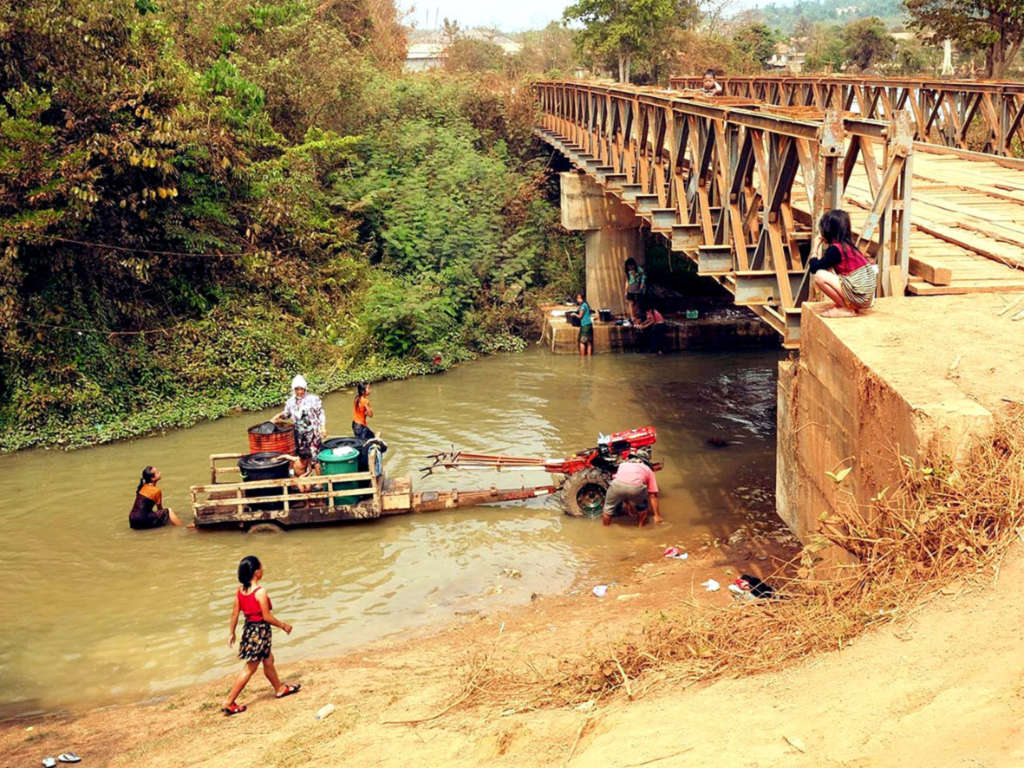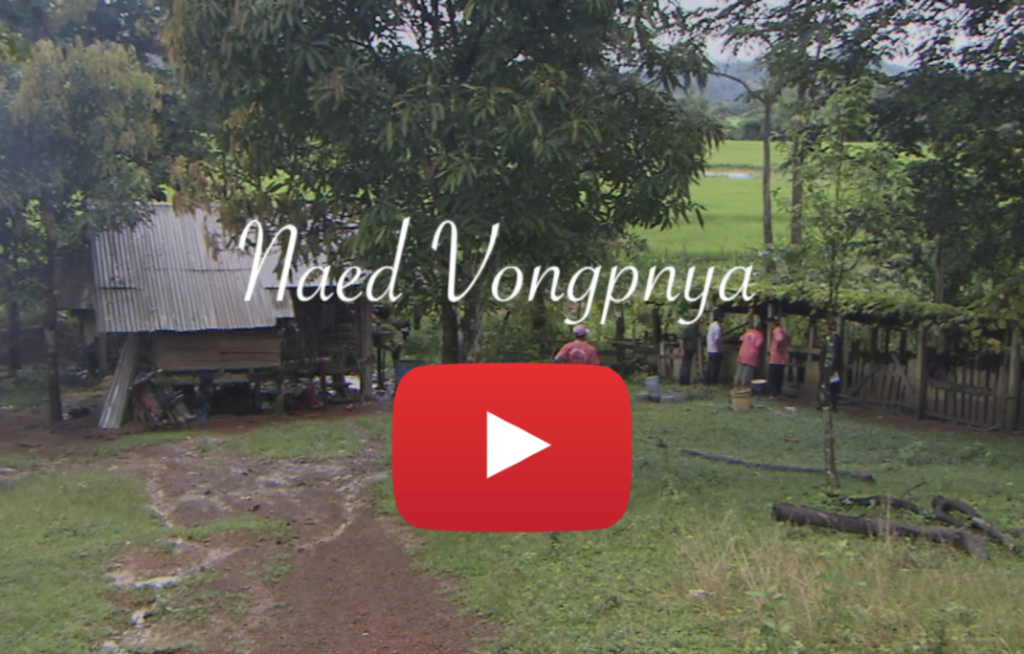Information
- Country
- Laos
- LuxDev's Regional office
- Asia Office
- Sector
- Socio-economic development
- PIC 4
- 2016 - 2020
- Implementation period
- 11 May 2017 - 31 December 2022
- Total duration
- 68 months
- Total budget
- 32,409,343 EUR
- Contribution breakdown
-
- Luxembourg Government
32,409,343 EUR
Videos
LAOS - Village Credit Scheme helps improve lives of the poorest of the poor.
"Life has been tough since my husband become a disabled person. A few years ago, I wanted to start a household business but no one would give me money beause I had no guaranty for the loan. Then, fortunately I received a first loan of 500,000 kip from the village credit scheme which enabled me to raised some pigs and sell them out for a good price. I have now borrowed 3,000,000 kip from the village credit scheme to grow my pig raising business. So, thanks to the credit scheme, if things go according to plan, I hope I could earn more income to support my whole family through the next batch of pig selling."
Nad Vongprya, a member group of village credit scheme, Bolikhan district, Bolikhamxay province.
A small loan can lift a poor out of poverty. The story of Bounthavy Daungphachanh, rice farmer.
LAOS - Stories of change in Bokeo, Bolikhamxay, Khammouane and Vientiane Provinces
The Local Development Programme for Bokeo, Bolikhamxay, Khammouane and Vientiane Provinces (LAO/030), which was implemented between May 2017 and December 2022, supported the Lao government's poverty reduction strategy for rural upland development, through community development, governance and capacity building, and access to infrastructure.
Discover in video the achievements of this project and testimonies.
Experience card

LAOS - Mise en œuvre du système d'information géographique dans un programme de développement local
LAOS - GIS implementation in a local development programme - executive summary
Technical and Guidance Notes

LAOS - GUIDELINES FOR MAINSTREAMING GENDER IN ICP V
LAOS - GUIDELINES FOR MAINSTREAMING HUMAN AND FUNDAMENTAL RIGHTS IN ICP V
LAOS - GUIDELINES FOR MAINSTREAMING ENVIRONMENT AND CLIMATE CHANGE IN ICP V
LAOS - GUIDELINES FOR MAINSTREAMING DIGITAL FOR DEVELOPMENT IN ICP V
LAOS - GUIDELINES FOR MAINSTREAMING CAPACITY DEVELOPMENT IN ICP V
Mid-term evaluation
Final evaluation

Laos has seen a rapid macro-economic progress in the past decade with annual GDP growths averaging 7.8%. Nevertheless, the country is still considered a Least Developed Country, ranked 138 of 188 nations in the United Nation’s Human Development Index, and 132 in terms of per capita GDP. Inequality has also increased, including a widening gap between urban and rural areas, particularly the remote upland areas, populated largely my ethnic minority groups. Upland communities have generally lower income, education, health, nutrition and other social indicators compared to urban and lowland communities. This is partly linked to physical isolation, difficult access, and low agricultural potentials, but also to resource competition, environmental degradation and weak public service delivery. Most upland villages still rely on traditional land-use systems, which are increasingly difficult to maintain owing to competition for, and regulations on, the use of natural resources. Despite improving access to roads, electricity and public services, many communities have had difficulties breaking into a more modern economy, land use practices and employment opportunities. Upland villages are therefore often in a precarious economic, social and environmental situation. Recent government policies and plans have emphasised the need to deal effectively with poverty and related problems in such disadvantaged areas.
The ‘Local Development Programme for Bokeo, Bolikhamxay, Khammouane and Vientiane Province’ supports the government’s poverty reduction strategy for upland rural development. It focuses on the 14 poorest districts in four provinces, particularly 230 target villages with a population of 150 000, 76% of whom are ethnic minorities.
The Project supports practical community development combined with governance strengthening for poverty reduction. This two-tiered approach means that the government systems can be informed and improved through demand-driven priorities, field evidence, and actual practice, while the practical development work can benefit from better application of policies, programmes, regulations and public services.
Most of the 23 million EUR budget from the Government of Luxembourg is supporting community development and infrastructure access in the 230 target villages. The community development is based on participatory village development plans, and on funds averaging 35 000 EUR per village that are managed and used democratically by the community for economic, social and environmental activities. These may include community investments in for instance sanitation, upgrade of schools, land management, agricultural extension, training, credit schemes and special support to destitute households. In addition, funds are available for infrastructure development, mostly education facilities and improved water supply systems, identified and constructed to fulfil the Lao Government’s poverty reduction targets for access to education and clean water.
The governance strengthening focuses on improving the systems and capacity of government staff for more effective poverty reduction. This includes improved planning, monitoring, evaluation, donor coordination, investment management, and information systems. Based on the development activities selected in the target villages, the governance component is also able to strengthen the use of sector policies and technical interventions for effective service delivery. The project also supports and engage in policy dialog through participation in sector working groups and other network, knowledge management, and through hosting an annual conference on rural development.
The project is executed jointly by the Ministry of Planning and Investment and by LuxDev, the bilateral arm of Luxembourg Development Cooperation. The Provincial Planning and Investment Departments and District Planning Offices are coordinating the field implementation. For technical support, relevant sector departments are engaged, particularly in agriculture, education, health and public works. Village Development Committees in the 230 villages are responsible for coordinating at the community level, and for managing the village development funds.
The project is very broad in terms of interventions, partners, and geographical scope. It has also built in flexibility in the choice of activities to best respond to the needs and opportunities arising from the field level and the stakeholders. To deal with this complexity, the project is guided by four overall principles
Poverty focus: To ensure that the project contributes to poverty reduction, the target villages are selected among the poorest and most disadvantaged villages in the four target provinces. The project support pro-poor activities that are most likely to have a positive impact. This is done through village poverty analyses, participatory selection of activities, and by using the government poverty indicators and targets for prioritization of infrastructure investments. Success is measured through poverty indicators and targets, including targets defined by the communities. The aim is to use 70% of the project funds for actual investments in the target villages, which is essential for achieving the goal of bringing most of the target villages above the poverty line by 2021.
Alignment: To ensure ownership, efficiency and capacity strengthening, the project uses Lao national systems for carrying out the work. This means activities are managed by government agencies according to their regular mandates - using the government systems for planning, management, procurement and reporting. Plans are linked to national planning, monitoring and evaluation systems. To ensure that the alignment is carried out in practice and that the partners can take full responsibility and credit for the work, around 80% of the budget is channelled through government partners at village, local and national level.
Integration: The development activities are determined by the villages’ needs and opportunities for poverty reduction. Once these needs have been identified, the project is able to engage relevant government partners, private service providers and civil society organizations in the practical work. The project also supports the Lao Government’s decentralization policy by engaging stakeholders at village, district, province and national level according to their stipulated role. This functional and hierarchical integration is held together by participatory village development planning carried out by the communities with support from the local Planning Departments, which outline the activities, budgets and involved stakeholders. These plans are further incorporated in the district and province plans for coordination and oversight.
Capacity strengthening: The Governments of Laos and Luxembourg acknowledges that there are gaps in the capacity of the public sector and the target communities to carry out the project. Project implementation is therefore closely linked to capacity strengthening of the government staff and community members, and to organizational and institutional strengthening particularly regarding the practical application of government systems. Structured capacity development plans are made for all major project interventions, and supported by training, coaching, experience exchange, in-country study visits, technical assistance. To ensure sufficient accountability, transparency and reporting, Lux-Development’s project team is carrying out certain technical, administrative and financial functions and compliance checks, but with the aim to gradually phase out this role as the local capacity increases.
The project targets and modalities are ambitious, but we have reason to believe we can pull it off. From 2010 to 2016, the Lao Luxembourg Cooperation Programme carried out a similar project in Bolikhamxay Province. The 7.6 M EUR project focused on 60 poor upland villages in the more remote uplands, where most people at the start of the project lived on less the 0.7 USD per day. After six years, practical achievements included:
- 396 community projects carried out through village development funds;
- 46 community-owned credit schemes;
- 78 schools, water supply systems and other constructions; as well as
- training and awareness campaigns in 90 villages.
Furthermore, about 100 governance strengthening activities were supported throughout the province. As a result of this support and other socio-economic development, the number of target villages officially classified as poor dropped from 60 in 2010 to only three villages in 2016.
A key to this success was the fact that almost three-quarters of the budget was spent on practical village development. Apart from the tangible development results, the project helped institute practical means of local democracy, participation and empowerment, which is key for the future sustainable development in the villages.
Latest news
LAOS - New teaching and learning methods benefitting children in rural areas
The Local Development Programme for Bokeo, Bolikhamxay, Khammouane and Vientiane Province, LAO/030, recently piloted an intervention to promote Child Centered Education (CCE) in the target provinces. The activities started in 20 schools in Bokeo province in October 2021 and have been rolled out to the other three target provinces. To date 85 primary schools have taken part.
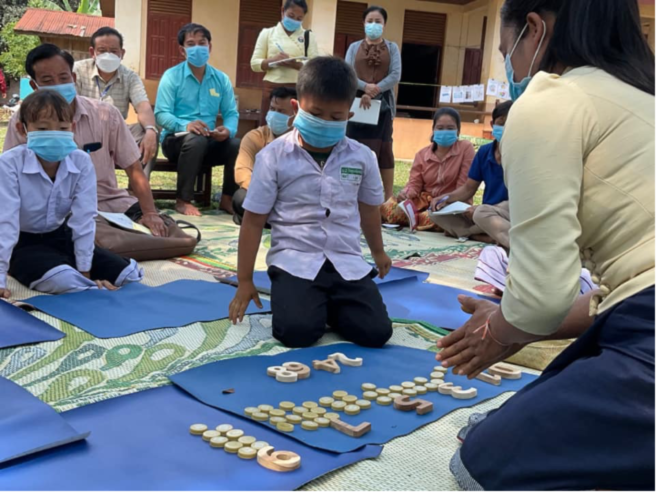
CCE working spaces at primary school, Phonyeng village, Phueang district, Vientiane Province
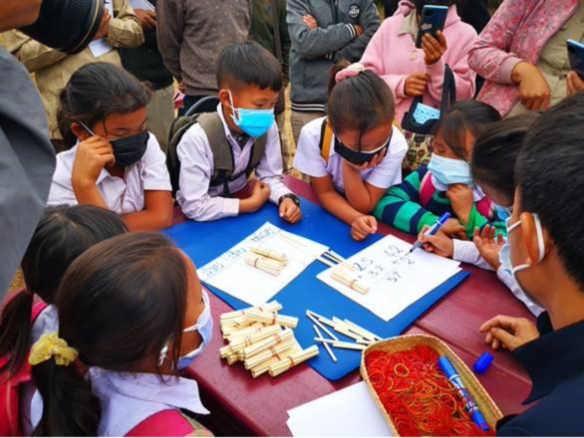
CCE working spaces in Bolikhamxay: working with math sticksA focus on materials, knowledge and skills
The approach of the intervention is to integrate Teaching and Learning Materials (TLMs) and Child Centered Education into the daily teaching routine. As a result of this, teachers are empowered to create their own “easy to make” and long-lasting TLMs.
During a four-day hands-on training at a rural primary school, the teachers of 10 target villages learned about the principles of CCE, how to integrate CCE into their daily work, and how to set up a dedicated learning corner in their classrooms. CCE is an approach to engage the students in the learning process, through physical learning tools and which emphasises play-oriented learning, problem-solving and communication.

Exploring teaching and learning materials, Savannakhet Teacher Training College
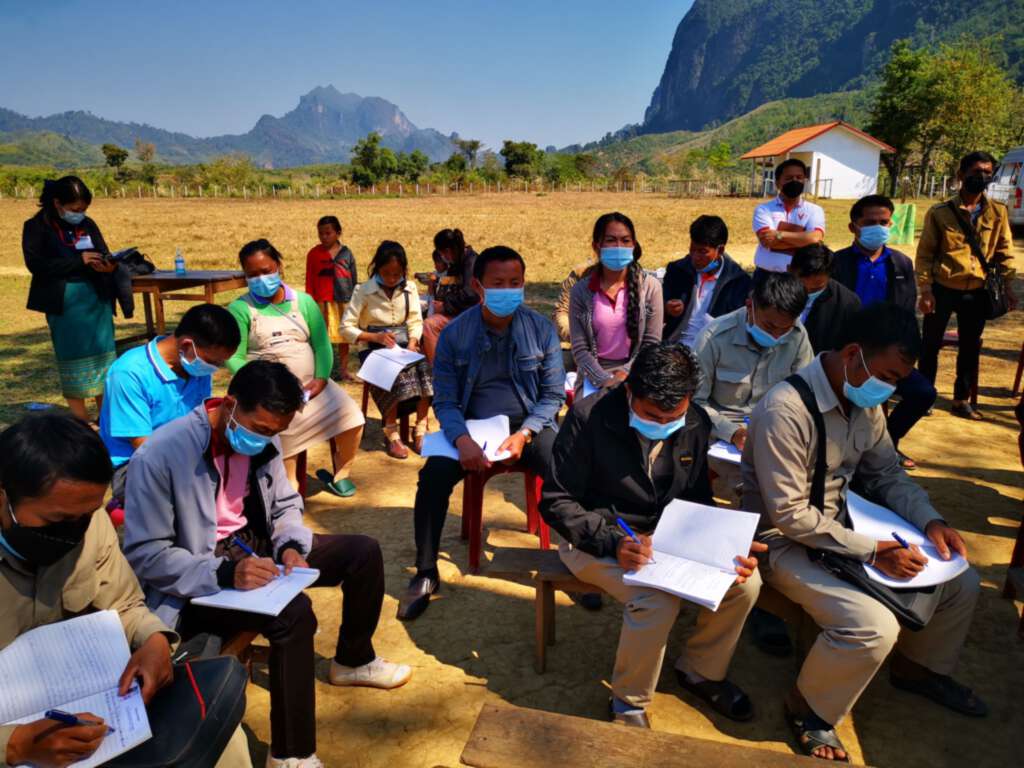 CCE working spaces in Vientiane Province: training on crafting long-lasting teaching and learning materials
CCE working spaces in Vientiane Province: training on crafting long-lasting teaching and learning materials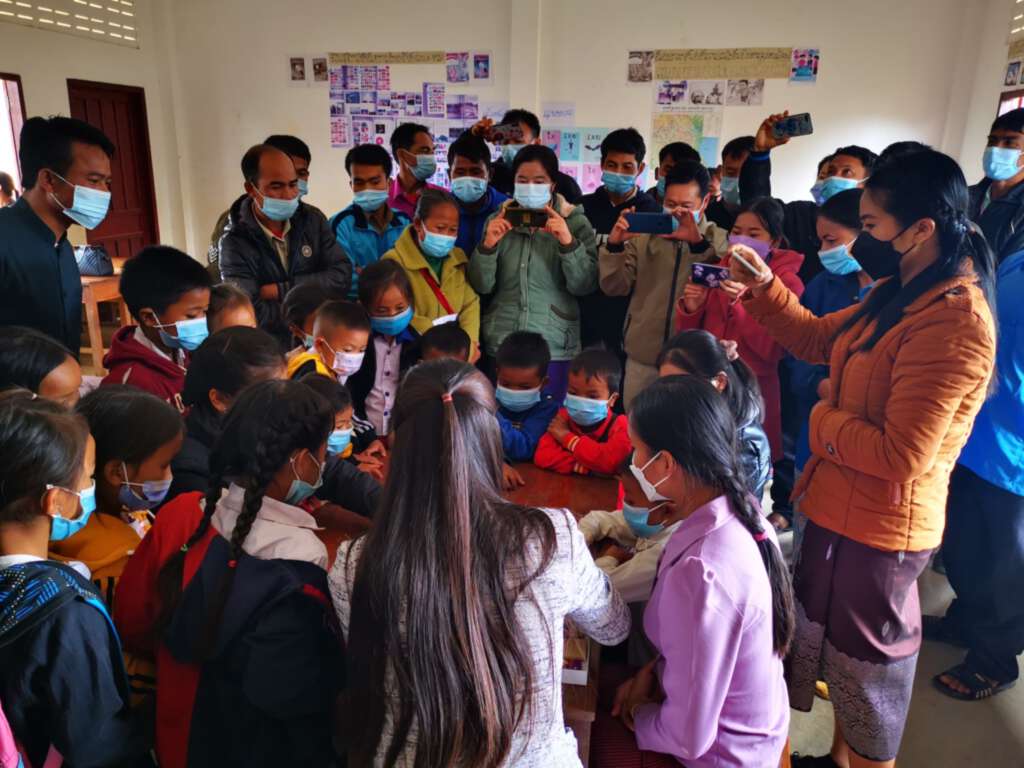 CCE working spaces in Bokeo: demonstration with primary students
CCE working spaces in Bokeo: demonstration with primary studentsThe involvement of primary school children in the training proves how easy it is for young learners to adapt to the child centered methods. All knowledge was transmitted in a practical manner and the teachers applied what they learned in the classroom immediately after the training.
Creating a network
Agile networks facilitated via the use of online tools show the changes back in the village schools. The networks are moderated by the trainer teams who provide further assistance and follow-ups.
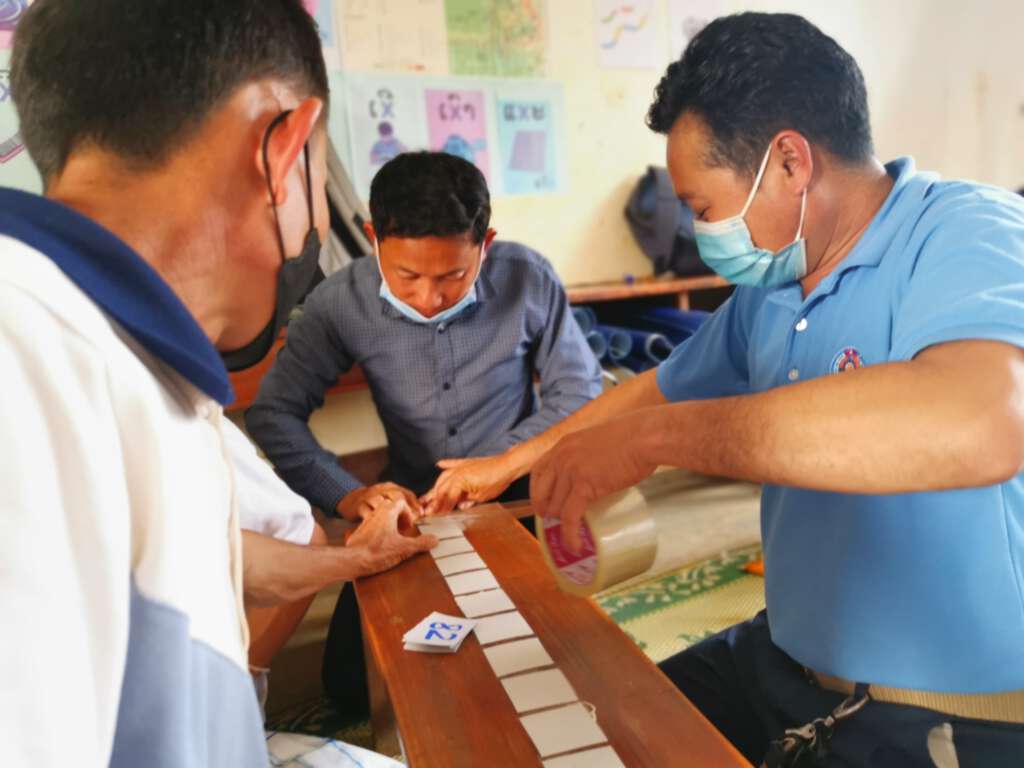 CCE workshop Bokeo: crafting skills
CCE workshop Bokeo: crafting skills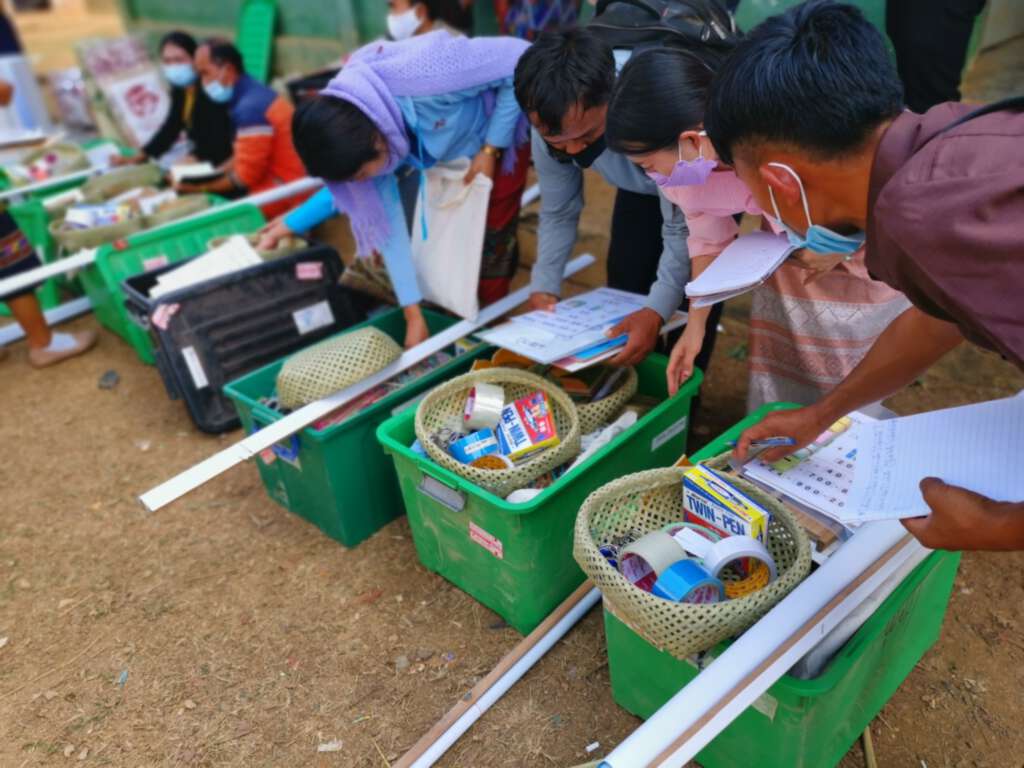 Handing over teaching and learning material and crafting tools to the primary schools
Handing over teaching and learning material and crafting tools to the primary schools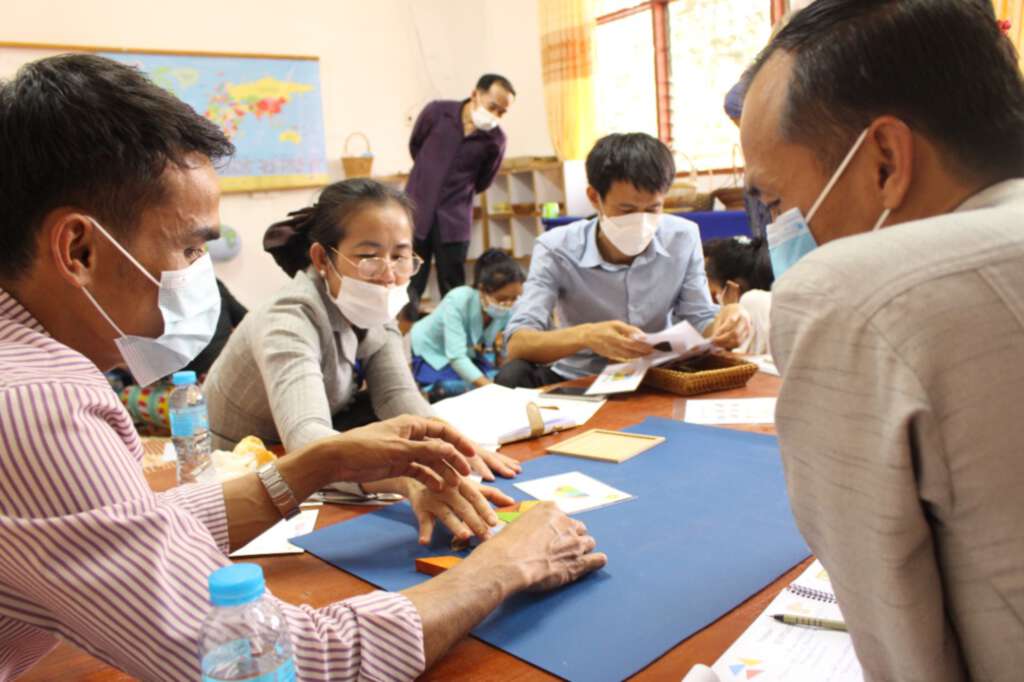 CCE training of trainers n°4 at Savannakhet Teacher Training College
CCE training of trainers n°4 at Savannakhet Teacher Training College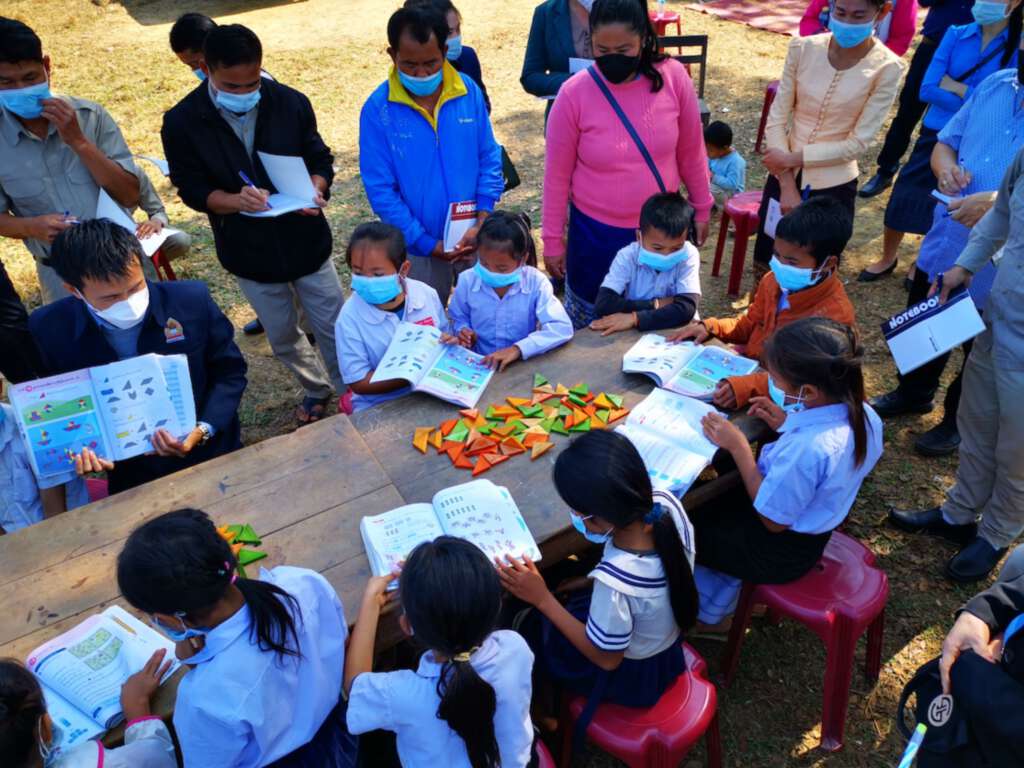 CCE working space n°3 in Vientiane Province learning with wooden triangles
CCE working space n°3 in Vientiane Province learning with wooden trianglesThe intervention combines capacity strengthening and promotion at many levels:
- training of trainers on CCE at the Teacher Training College (TTC);
- the creation of CCE team working spaces at the TTC;
- the organisation of CCE workshops for primary school teachers, District Education Sports Bureau and Provincial Education and Sports Services;
- and the creation of CCE networks.
The LAO/030 programme is co-funded by the Government of Laos and the Grand-Duchy of Luxembourg and is implemented by the Ministry of Planning and Investment and LuxDev, the Luxembourg Development Cooperation Agency.
LAOS - Healthy food for a better life A story of Ms. Khamkone: The empower women
"I grew up in a low-income family that subsisted solely on rice. I had to drop out of school when I was fourteen to help my parents earn money. I moved to Nahad after marrying my husband and I had three children", says Khamkone, a 56-year-old woman, a model farmer for organic vegetable growers.
"Fortunately, I was able to complete fifth grade as there are only a few people in my neighbourhood who can read and write. With the added responsibilities of leading and serving as a role model for others, my life as the head of the village was challenging. I didn't have much money to begin with, so I had to work very hard to be a mother, a wife, and the leader of this community all at the same time”, Khamkone recounts.
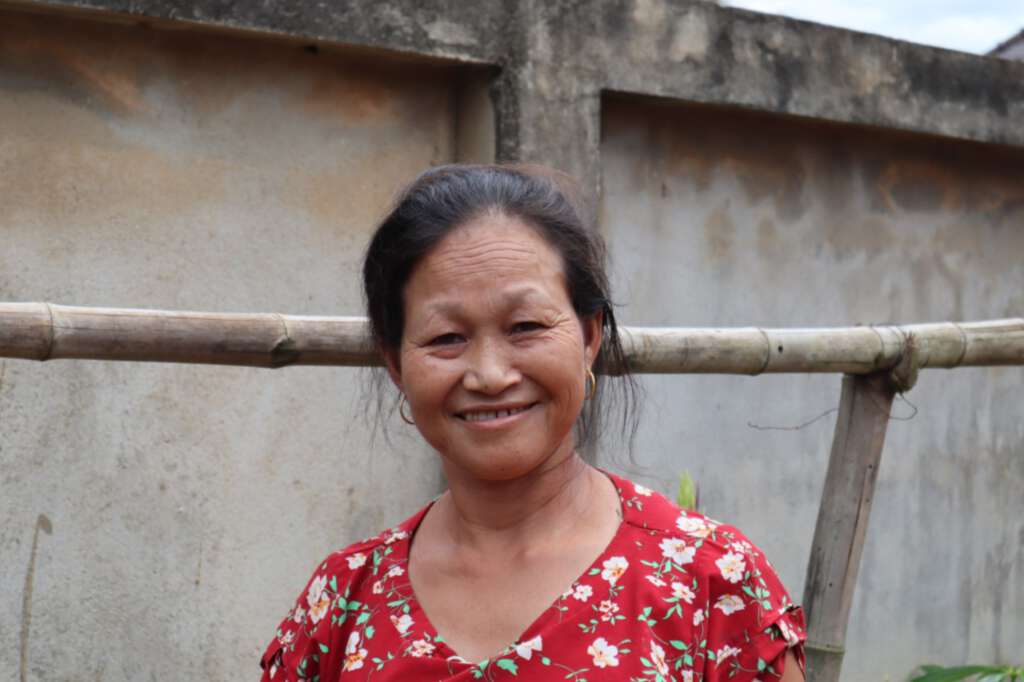
Ms Khamphone a model farmer at Nahad village Khamkurd district, Bolikhamxay province, © LuxDev
Nahad is one of the LAO/030 programme’s target villages in Khamkeud district. The village is located in a remote area close to the Vietnam border, 22 km away from the district’s main town. Currently Nahad has a population of 699, made up of 121 households who mainly belong to the Lao-Tai ethnic group. The Local Development Programme LAO/030 aims to improve living standards in its target villages. Often this support builds on the existing knowledge and resources in the villages, and further develops villagers’ skills, allowing them to improve their living conditions in a sustainable way. In the case of Nahad, its villagers considered healthy food a key priority and set the vision of being declared an organic vegetable producing village by the end of 2021. There is a long way to go before being certified, and they must go through many steps and meet numerous administrative and technical requirements. Still, through the LAO/030 programme’s village development fund, Nahad now has the opportunity to transform itself into a model village for organic agricultural production. To do so, representatives from the production group and the agricultural extension office went on a study tour to Xiengkhuang province in June 2020 to learn from other organic vegetable production groups. It was a positive visit, which not only gave them the opportunity to learn and to ask questions, but also more confidence to continue their organic planting when they returned home.
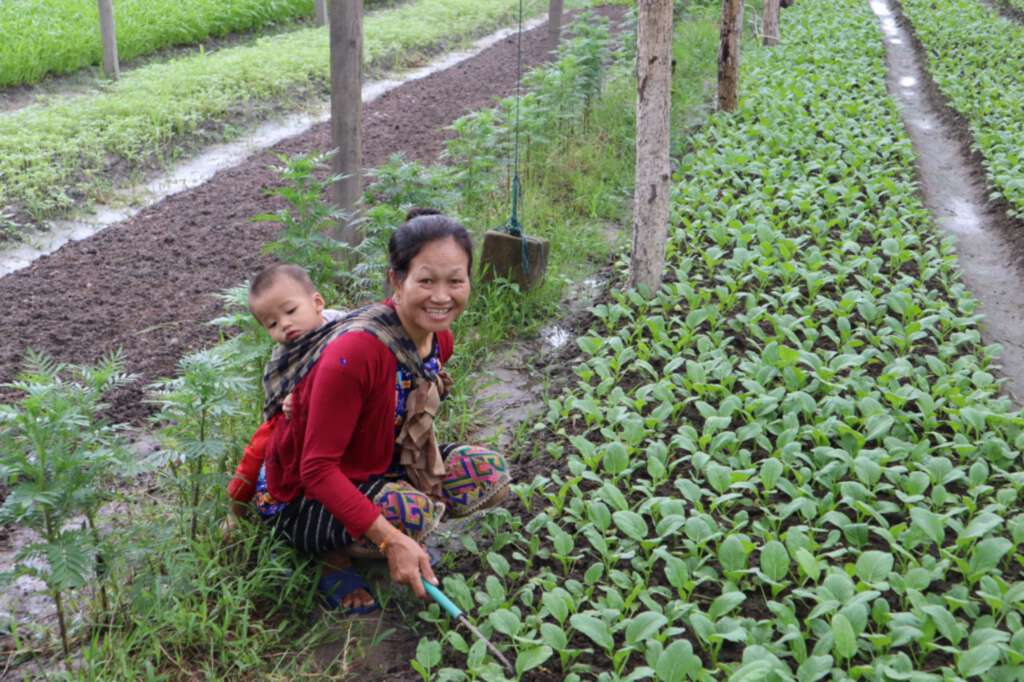
Khamphone enjoys taking care of her vegetables, © LuxDev
"It was my first visit to Xiengkhuang province. I was overjoyed. We visited several villages to learn about organic planting processes, composting, chemical-free production methods and how to use local resources for pest control and bio-fertilizers, which completely changed my perspective on planting and farming."
Upon her return, Khamkone began to make bio-fertilizers and compost. She immediately noticed a difference as she was able to save on fertilizer and sell more vegetables that are now chemical-free.
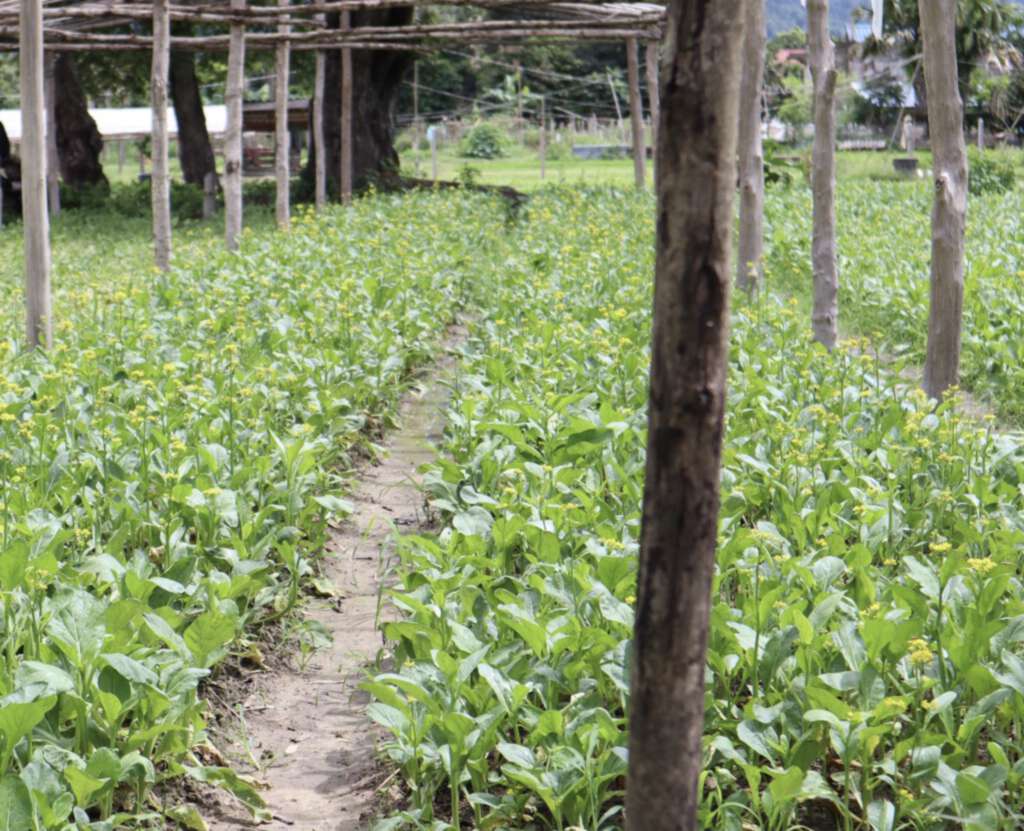
In February 2021, 29 members of the Nahad production group participated in a five-day training course on organic vegetable growing techniques and practices, with the help of a resource person who they met in Xiengkhouang in June 2020.
"After learning about the dangers of chemical fertilizers and pesticides, as well as the benefits of using natural waste, I have never grown in the same way again. In terms of health and finances, my life has considerably improved. The best thing is that our food is completely safe. I can really see my family living healthily and happily", Khamkone says.
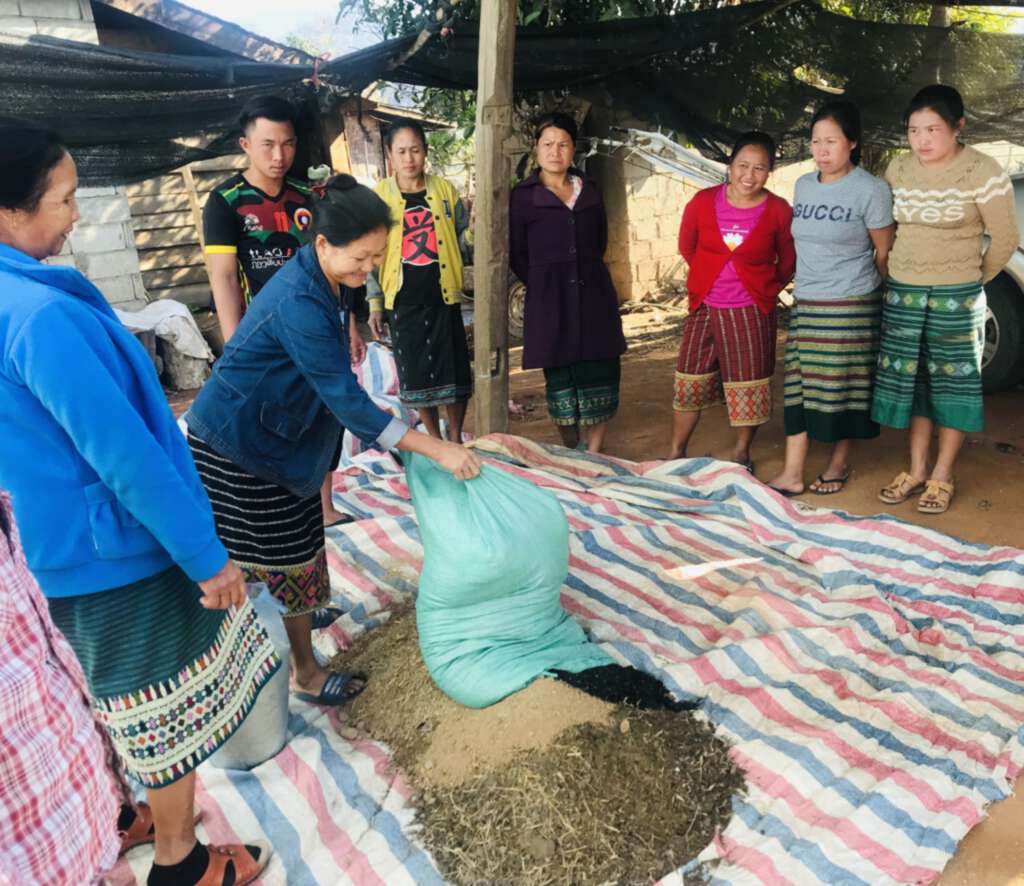
Khamphone is showing to her villagers how to make bio-fertilizers, © LuxDev
Nowadays, the many villagers have adopted organic farming methods and local resources for creating compost fertilizer and bio-pesticides for insect control. Furthermore, with the assistance of the Clean Agriculture Standard Center (CASC), three selected farmers, including Khamkone, were recently trained to be members of Internal Control System (ICS) to control and monitor the usage of chemical fertilizers.
Through the three model farmers, the CASC can monitor local compliance with ICS standards. The CASC regularly consults with them to help them in achieving their goal. Moreover, the district agricultural office is attempting to create market areas where organic veggies can be sold.
I will continue to push for organic products. The challenge is that some farmers are still reluctant to grow organic vegetables over fears of losing produce. This motivated me to become a successful example and to prove that what we were aiming to do can be done..
Ms Khamphone a model farmer-Nahad village, Khamkurd district, Bolikhamxay province
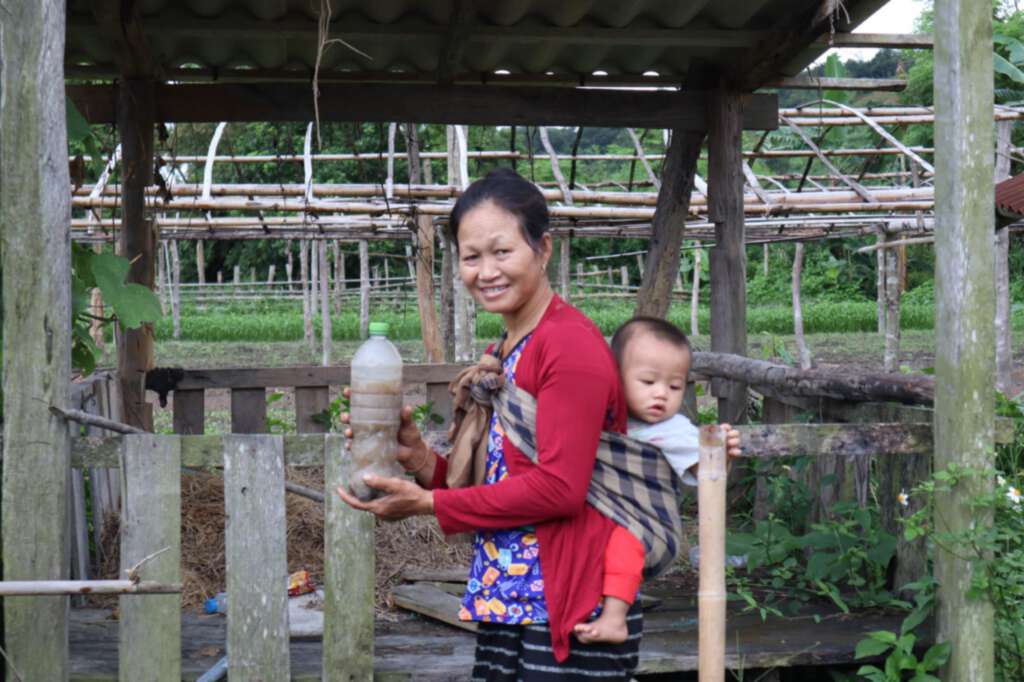
Nahad village is currently an important production area, creating jobs for local middlemen to deliver vegetables to the three main markets and neighbouring areas, improving food security in the district. The goal of becoming a model organic community is not far away if the district and village maintain their intention and the serious effort it requires.
To raise peoples’ standard of living, the programme will strive to upscale good practices such as these and will continue to support farmers.
Organic vegetable production has become increasingly popular in the Lao PDR in recent years. As the standard of living and education has improved, people have become more aware of the importance of consuming better and healthier foods, including vegetables free from chemical fertilizers and pesticides. At policy level, the 9th National Social and Economic Development Plan (NSEDP) 2021-2025 has highlighted the need for a sustainable management and use of natural resources, and a national green growth strategy entailing environmentally friendly practices in agricultural production. Consequently, the Lao government is currently working to reduce the use of chemicals fertilizers in agriculture and to support organic farming practices by transitioning away from chemically fertilized vegetables to cleaner vegetables (grown with a minimum use of chemical fertilizers and pesticides, meeting safety standards for consumers) and finally to purely organic vegetables.
The Local Development Programme for Bokeo, Bolikhamxay, Khammouane and Vientiane Province, LAO/030, is co-funded by the Government of Laos and the Grand Duchy of Luxembourg and is implemented by the Ministry of Planning and Investment and LuxDev, the Luxembourg Development Cooperation Agency.
LAOS - Understanding peoples’ interestsA story of Somchit Siliphong
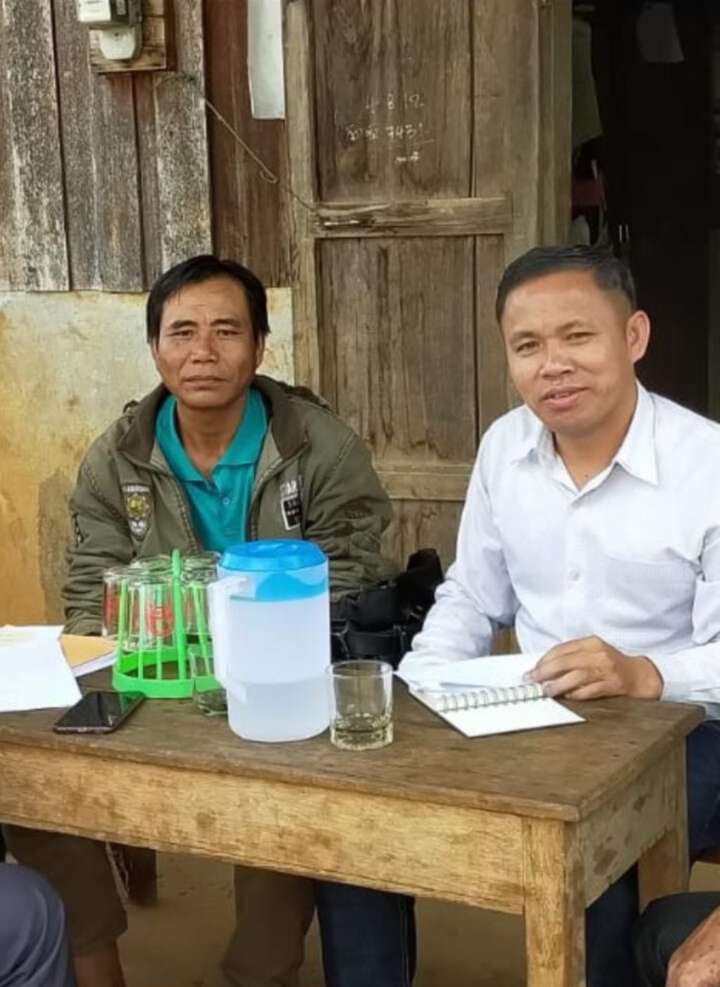 Somchit Siliphong (right) is interviewing with target villagers in Vientiane Province
Somchit Siliphong (right) is interviewing with target villagers in Vientiane ProvinceI conducted these interviews after a training by the Provincial Agriculture and Forestry Office (PAFO) because I wanted to know how the villagers feel about activities such as these. I have been working in rural development for quite a few years now and I want to understand peoples’ motivations and their views on how they think they can improve their situation.
I am happy that the two people that I interviewed showed a keen interest in following up on the training and in putting into practice what they learned.
Overall, I am very satisfied with the cooperation among the stakeholders of the LAO/030 programme, from government line agencies to villagers. It makes me happy to see changes in the villages, such as people getting access to clean water or villagers having fully equipped village halls that they can use for village meetings and events. It is good to see people looking forward to a better future with improved skills in managing their resources.
We are hoping to continue this work until we can see some indicators of sustainability in the villages.Somchit Siliphong, Village Development Fund Advisor, LAO/030 Vientiane Province
Somchit has been with the Local Development Programme for Bokeo, Bolikhamxay, Khammouane and Vientiane Province - LAO/030 programme for three and a half years and he has been advising the partners in the implementation of the Village Development Activities financed through the Village Development Fund.
More insight of Somchit interviews
Mr. Soula Phaxai is a village authority and member of the Village Development Committee. He is 54 years old, married, and has four children. Two of his children are already married while the other two still live with him. He is a paddy rice farmer and he plants vegetables and other crops during the dry season. He also raises livestock.
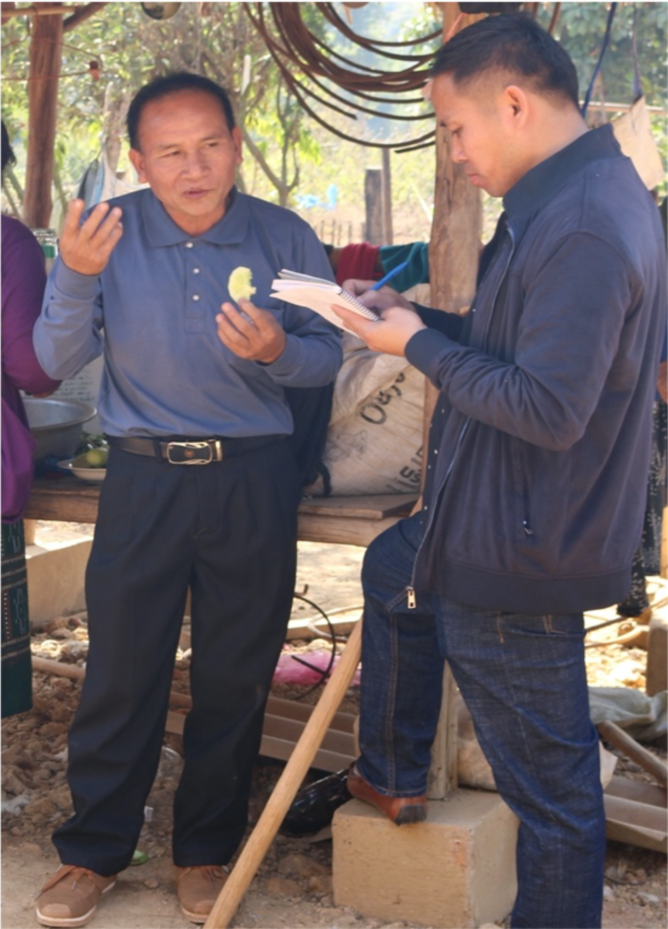
Soula Phaxai (left), participant at the crop and compost production training Nabon village, Fuang district – Vientiane provinceHe recently planted rice in his paddy area and lemons in his garden. He aims to plant some vegetables in his paddy land during the dry season, as he has enough labor capacity with the help of his family.
“We are four people who can work together on the land”.
Soula recently participated in a training supported by LAO/030 on the production of organic crops and compost fertilizer.
“Through the training I learned how to make fertilizer. I will do this using tree leaves and animal manure.
I am also a village credit scheme beneficiary. I am using the money for goat raising.
We have a lot of plans in the village. In the future I would like to have a study tour to other villages and see other examples of organic farms and livestock raising. We also plan to have production groups and help each other to produce more crops and livestock. I also would like to propose a training on how to properly prepare the land and mix the soil before planting crops.
Being a member of the Village Development Committee and also a village authority, I can say that this project is really supporting us to develop our village; we already repaired our gravity-fed water system and the bridge in our village, constructed the village hall and received a village speaker, and supported the construction of latrines for households who didn’t have one.
Personally, I am so happy because the project has had positive effects on my family and our village.”
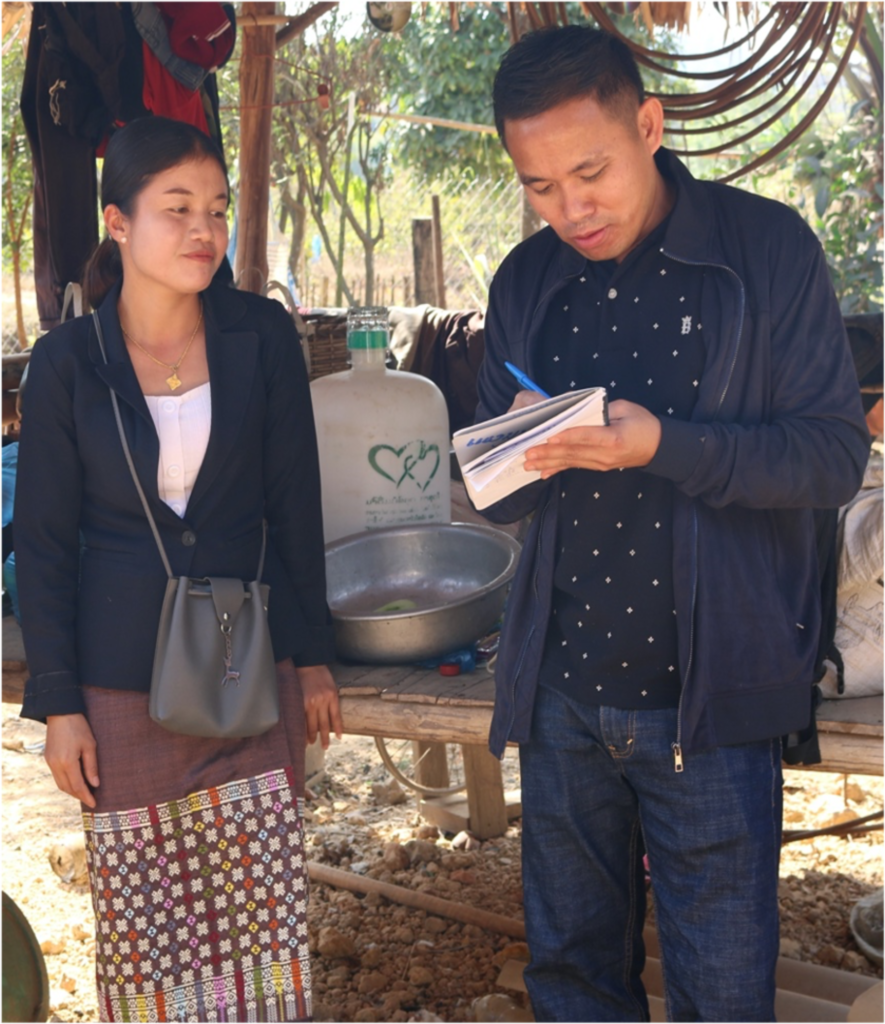 Ms. Phone (left), the trainee on the crop and fertilizer compost training
Ms. Phone (left), the trainee on the crop and fertilizer compost trainingMs. Phone is 33 years old. She plants rice in her paddy plot, vegetable crops during the dry season, and raises livestock. She is married and has 2 children studying in primary school. She participated in the crop and fertilizer compost training.
“It was really good for me, as the trainer focused on organic crop production and how to make compost fertilizer for crops. For my family, the main livelihood is paddy rice production and dry season crop production. We also have some livestock. It’s just me and my husband who work in the field.
The training was very useful for me. I will try to make fertilizer from animal manure and dry leaves and grasses for my dry season crop production. I will also use some for my lemon trees.”
She is also a beneficiary of the village credit scheme and borrowed money to increase her vegetable production, which includes cucumbers, green beans and more.
Ms. Phone and other villagers are excited about what the future holds. They want to learn from visits to organic farms and farms that have successfully raised livestock. She is hoping that a technical training on how to properly prepare the land before crop planting will be provided.
“I would further like to propose to the programme and government to support the marketing of our products.
This project is a big help for the development of individual households and the village as a whole. Through LAO/030 we were able to repair our village bridge, construct the village hall and buy needed equipment. We have also submitted an activity proposal to the Provincial Department of Planning and Investment (PDPI) to improve the school access road and to repair our primary school building”.
The Local Development Programme for Bokeo, Bolikhamxay, Khammouane and Vientiane Province, LAO/030, is co-funded by the Government of Laos and the Grand Duchy of Luxembourg and is implemented by the Ministry of Planning and Investment and LuxDev, the Luxembourg Development Cooperation Agency.
LAOS - Of bees and communities – Poor households generate income through traditional beekeepingBeekeeping Development in Bokeo Province - LAO/030
The local development programme for Bokeo, Bolikhamxay, Khammouane and Vientiane Province - LAO/030 - supports beekeeping in target villages of Paktha, Pha Oudom and Meung districts through the Village Development Fund mechanism.
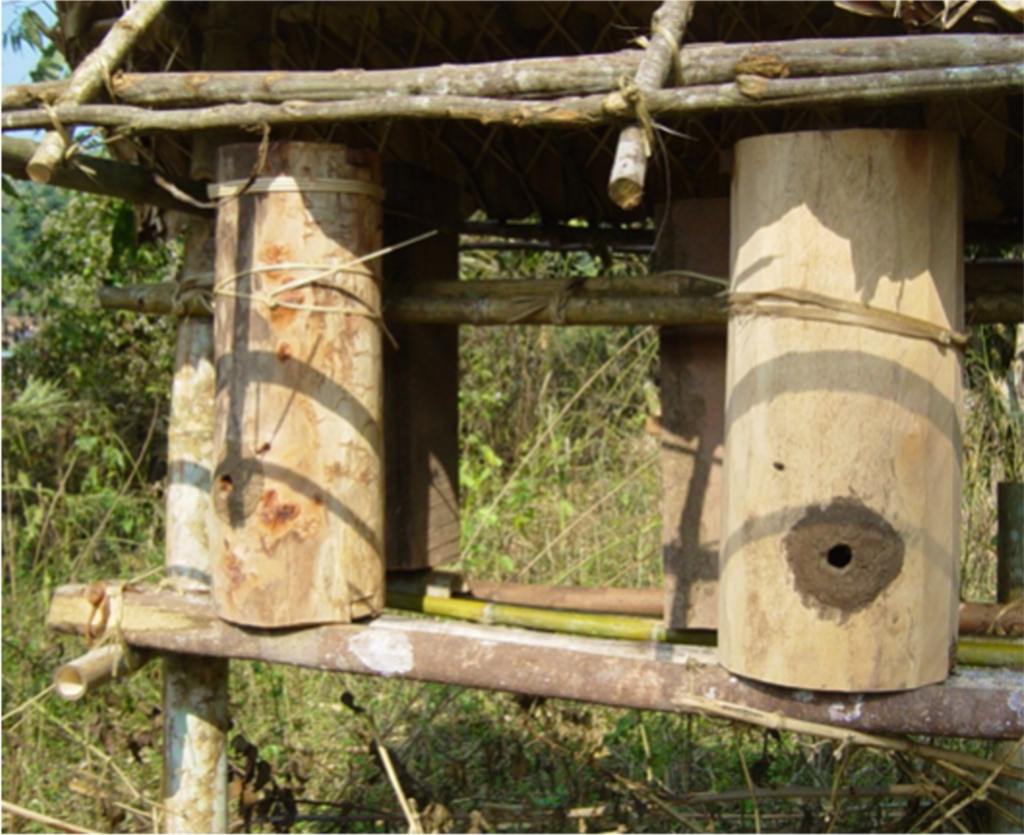 Log hives are being used for traditional beekeeping, © LuxDev
Log hives are being used for traditional beekeeping, © LuxDevMeung district has vast experience in traditional beekeeping. The LaoHu ethnic minority group and some villages that are mainly composed of people from the Akkha ethnic group produce a great amount of honey every year.
Traditional beekeepers use log hives, which are wooden hollow logs with an entrance hold for the bees that are placed in an uprightposition. In Laos the bee species apis cerana has been kept for hundred of years in log hives. In Bokeo province, the technique oftraditional beekeeping can only be found in Meung district. In the other districts villagers only collect wild honey from the forest.
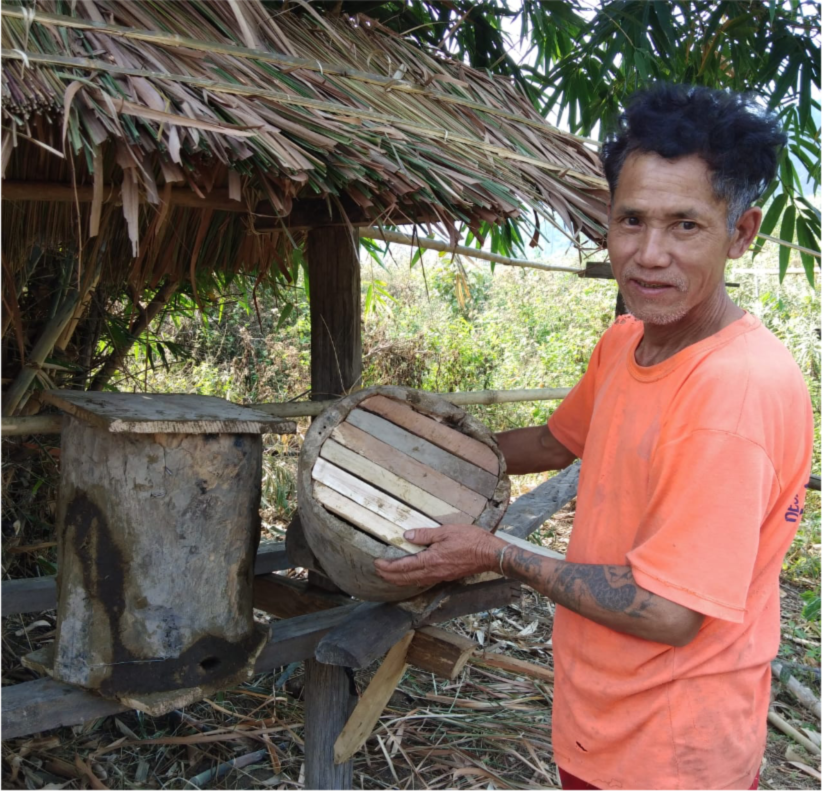 Mr Amkha Phanphangdy, 56 years old from Phoungpha village in Meung district who learnt traditional beekeeping from his father. © LuxDev
Mr Amkha Phanphangdy, 56 years old from Phoungpha village in Meung district who learnt traditional beekeeping from his father. © LuxDev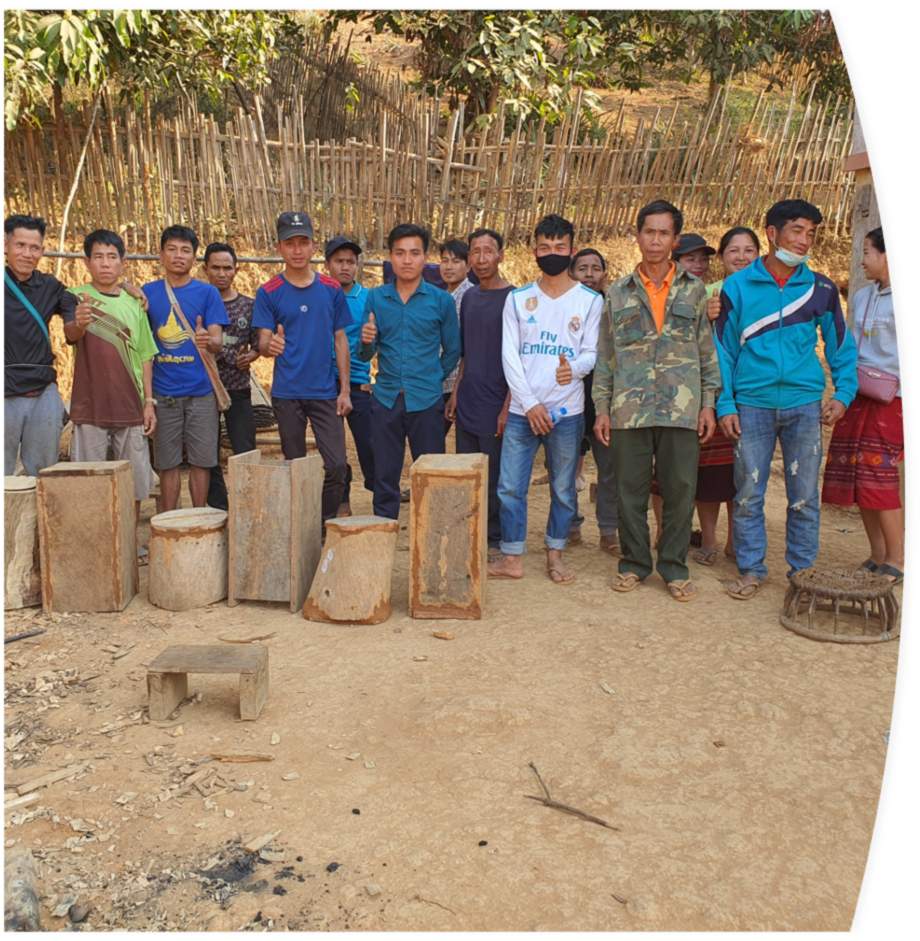 Beekeeping training participants, © LuxDev
Beekeeping training participants, © LuxDevBasic training on traditional beekeeping in Pha Oudom district
The LAO/030 programme supports traditional beekeeping in Bokeo’s other two target districts of Paktha and Pha Oudom. Interested villagers from several target villages participated in a theoretical and practical training led by Mr Amkha Phanphangdy, who is an experienced LaoHu beekeeper from Ban Phoungpha of Meung district.
This system of beekeeping with log hives is well suited to the natural environment and to the economy of small farmers. On average, one beehive provides 3 litres of natural honey. Honey is always in high demand at the local market or in urban areas. Farmers can sell a litre for 10$ US.
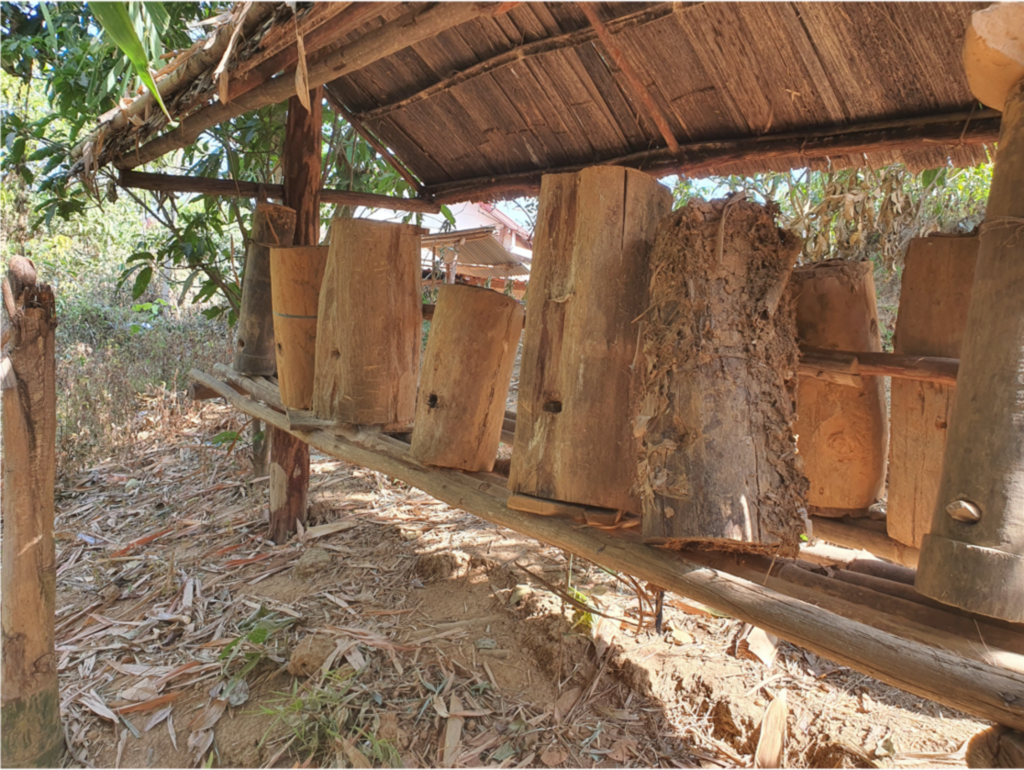 Community log hives, © LuxDev
Community log hives, © LuxDevPhoungpha, Mr Amkha’s village, counts 114 households and most of them have a small number of beehives. In total the village has 600 beehives which together produce of over one ton of natural honey per year.
So far there are three villages in Paktha and eight villages in Pha Oudom in which beekeeping has been introduced via a three-day intensive training course. Thirty villagers participated in the trainings and they have already set up their log hives near the villages.
Beekeepers can learn from other provinces
Another important step in improving beekeeping development in Bokeo was to introduce innovations, suitable techniques and other local systems from beekeepers in neighbouring provinces, such as Oudomxay. In Oudomxay a different system is used, and beekeepers have established a beekeeping association.
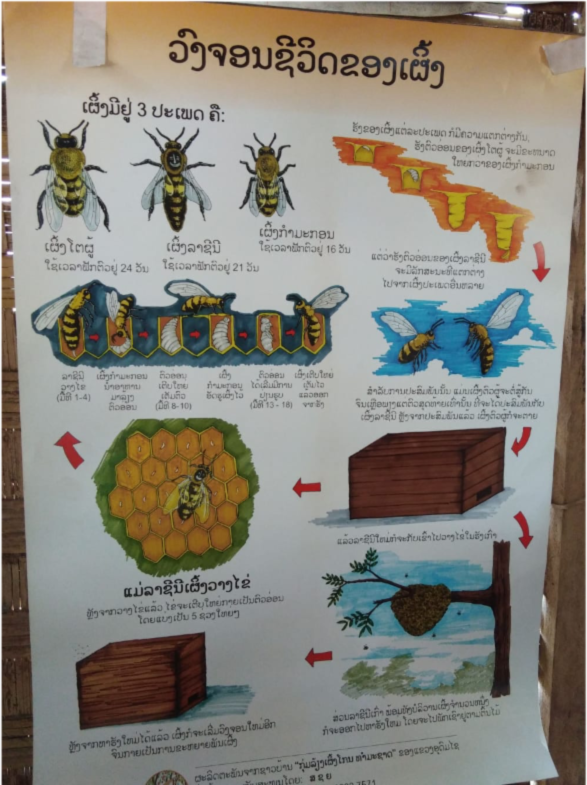
Training poster on the lifecycle of bees, © LuxDev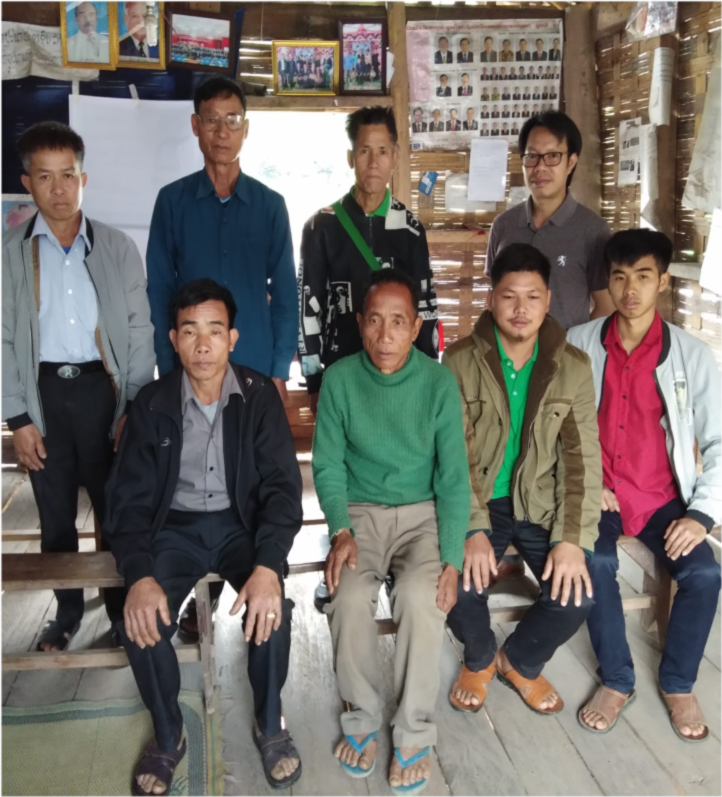
Experienced traditional beekeepers attend a week-long training with the beekeeping association in Oudomxay province, © LuxDevThe training was divided into a theoretical part and a practical part. The theoretical part highlighted the importance of bees for the environment, the lifecycle of bees and their entire system.
Top bar hives from Oudomxay
The practical part focused on the preparation and construction of top bar hives.
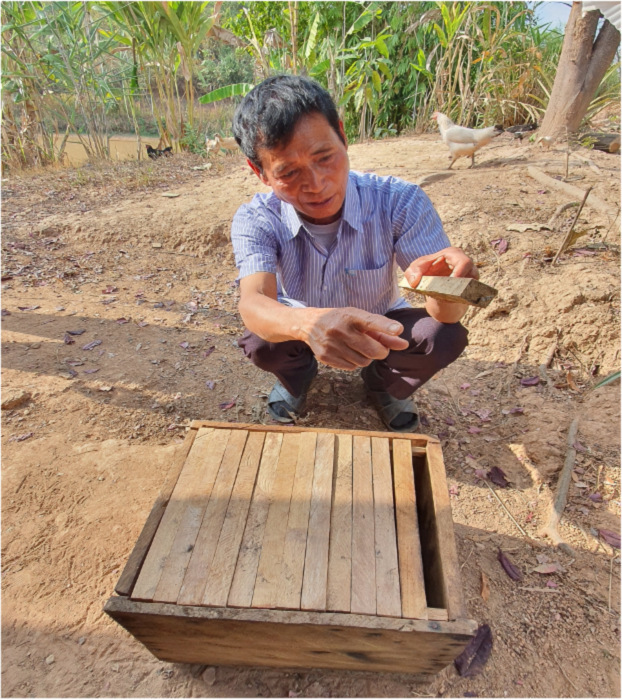
Trainer is demonstrating how the top bar hives are structured. © LuxDev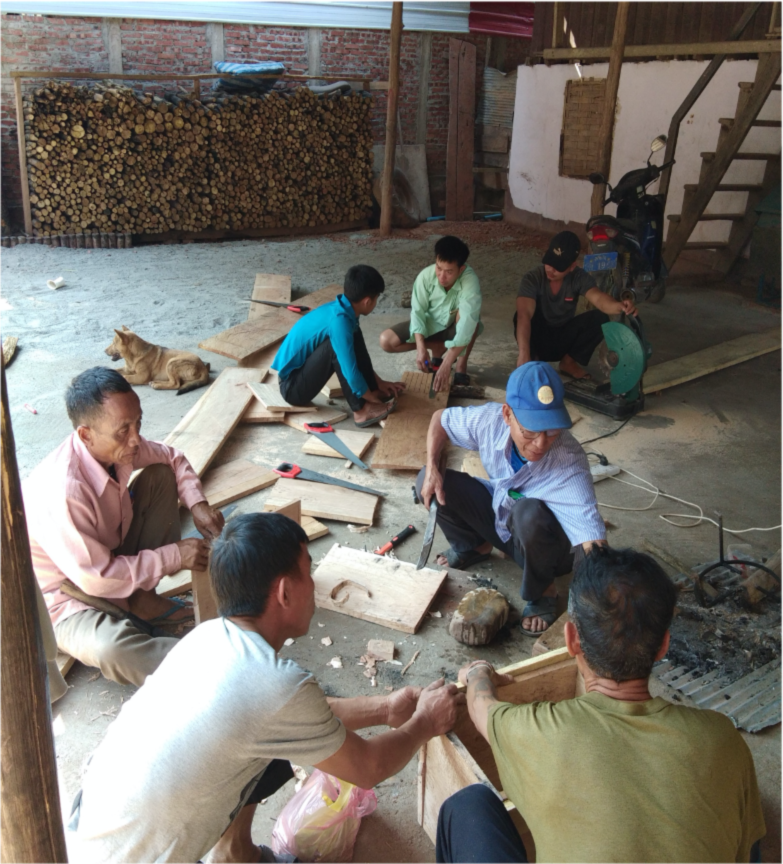
Trainees learnt how to make top bar hives, © LuxDevAs certified trainers they will use their knowledge to teach their local communities on beekeeping.
This approach will help to provide additional income to the poorest of the poor and it will also help to keep the environment intact.
Six newly formed trainers to promote local beekeeping in Bokeo
The new trainers will encourage villagers to start beekeeping, set up beekeeping groups in the village and will teach villagers how to produce quality honey.
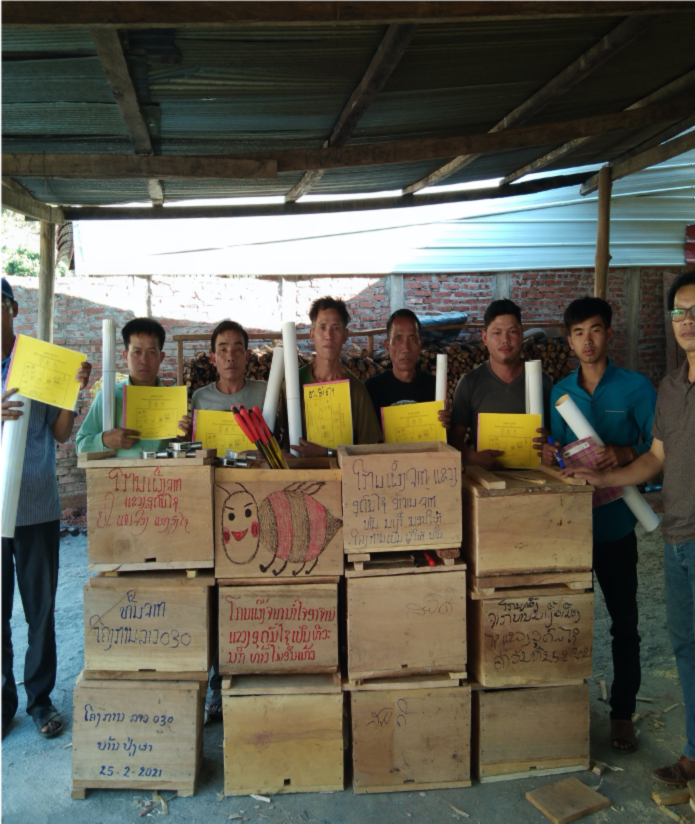
Six beekeepers will become trainers and start using top bar hives in their own communities. © LuxDevIn the long run LAO/030 will continue to support this initiative by providing inputs on marketing, aspects of value chain and by guiding the villagers on how to set up a beekeeping association in Bokeo province.
The Local Development Programme for Bokeo, Bolikhamxay, Khammouane and Vientiane Province, LAO/030, is co-funded by the Government of Laos and the Grand Duchy of Luxembourg and is implemented by the Ministry of Planning and Investment and LuxDev, the Luxembourg Development Cooperation Agency.
LAOS - Local development in support of poverty reductionFirst-Person reflection by Emma Aguiñot, LAO/030 International Province Adviser, Vientiane Province
It was in May 2017 when I first met my colleagues. There must have been 50 of us in total, with ages ranging from 25 to 70. I still remember the air of excitement and uncertainty in the room during our programme orientation, as we all smiled and assured each other – and ourselves – that we would fully grasp what our jobs and roles would entail once we start in the field.
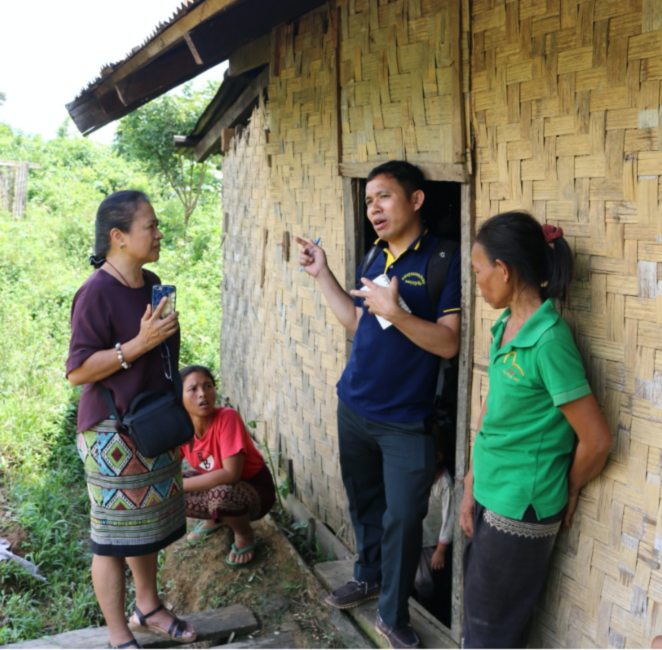
Emma Aguiñot (left) is interviewing with one of the target households in Kasi district, Vientiane Province. Photo credit: LuxDev
It was a slow but firm start. We validated the target villages that were recommended to us by our partners. In Vientiane Province, we validated 100 villages in order to end up with the final 41 villages that we are working with now.
Building of mutual respect and trust between LuxDev-hired staff and the staff of the partner agency increased, I can now confidently say that we trust each other in a way that allows us to work simultaneously in different areas when needed. This relationship has evolved in a positive way and has been strengthened by the systems that were established to promote transparency and accountability.
We shared frustrations when things did not turn out as expected and shared successes when we achieved our targets. We have jointly witnessed district staff evolve and grow in their positions as coordinators of different components. We have seen their children and families grow. We have seen a lot of movement of government staff and political leaders; and above all, we have seen people suffering due to poverty. We have seen people being very close to suffering from social exclusion. We hurt when they are unable to speak the language or when they have difficulties expressing themselves even in their own language. We were moved by this and by their spirit to fight poverty.
Below are just a few of the people who have inspired us to do more, to try harder, so that we can reach them. It is amazing to note that in the space of four years the communities have been able to do so many things through our project, but at the same time, we feel that there is still much left to do.
Faces of People Fighting Poverty
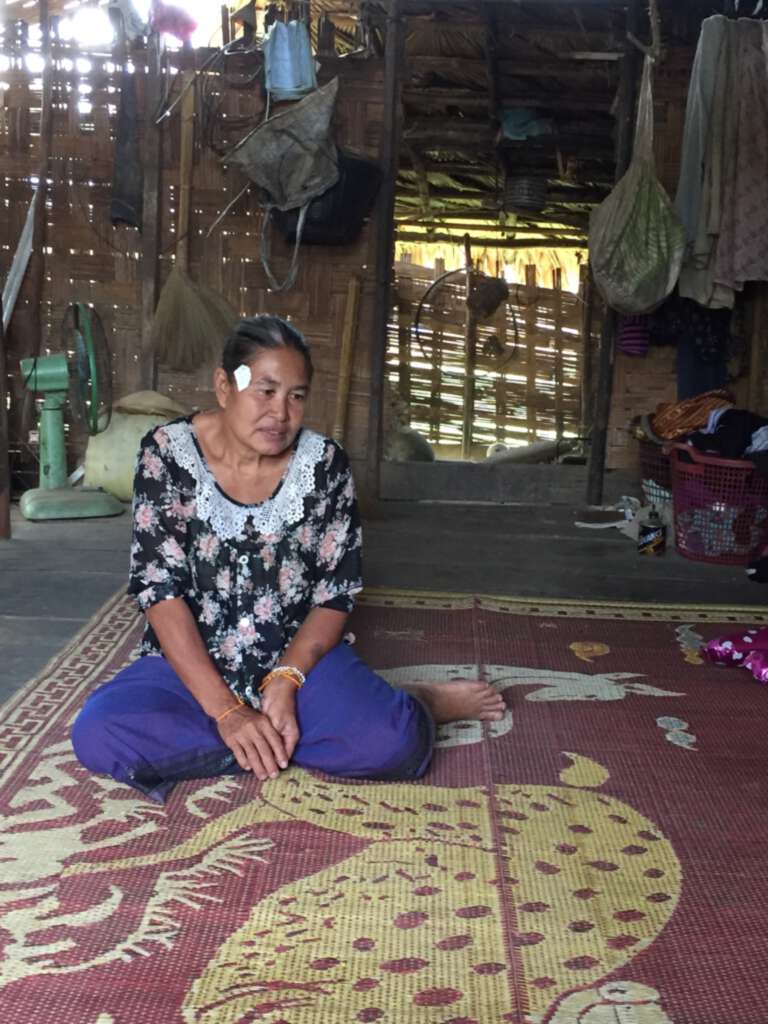
Ms Moth, Pakngan Village, Met District, Vientiane Province. Photo credit: LuxDev
My name is Moh, I am 59 years old. I am a widow with five children. Three of my children are married, while my two younger sons still stay with me in the house. We are classified as a destitute household. We do upland rice cultivation and I plant job’s tears. Five years ago, we did not have any problems with rice insufficiency because our ricefield produced enough and my husband was still alive. Since he passed away, my family has had problems with rice insufficiency. Currently our family’s main income comes from selling job’s tears and fish from the Mekong. We do not earn enough to buy things for daily consumption. Last year, my rice ran out in August. It was very good for me to receive the 80 kg of rice from LAO/030 and the cash transfer of 400,000 LAK. I spent 150,000 LAK on transportation to bring me to the hospital. I received support for constructing a latrine, and I am also using the gravity fed water system. I am hoping that the rice that I got from LAO/030 will cover our needs until the next rice harvest. I would like to request additional support from LAO/030 to set up a productive activity such as pig or poultry raising.
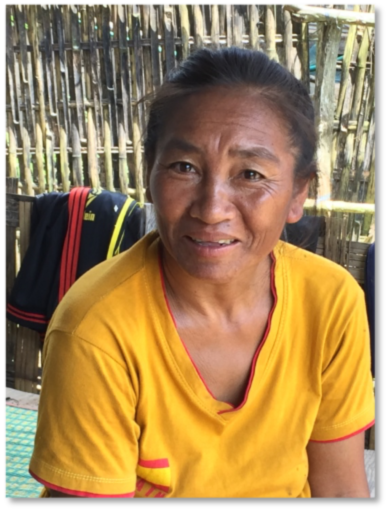
Ms Phong, Namai Village, Hinheup District, Vientiane Province. Photo credit: LuxDev
I am Phong, 44 years old, married and I have three children. I am raising my children alone. I just plant and sell vegetables. I don’t have a ricefield, I just receive support from my daughter who is working in the Vientiane Capital. LAO/030 is a very good project. It is helping our village. It supported households without latrines to get one, and I received this support. Under the COVID-19 response, I got 80 kg of rice and 400,000 LAK in cash. It helped a lot, as I have expenses for my children’s schooling and I need to buy other items for consumption. I would like to thank the project for supporting us. I would like to ask the project for support so that my children can finish high school and eventually attend a vocational school, college or university. I would like to request the project to provide us with technical knowhow to engage in productive activities, which may help me increase my income.
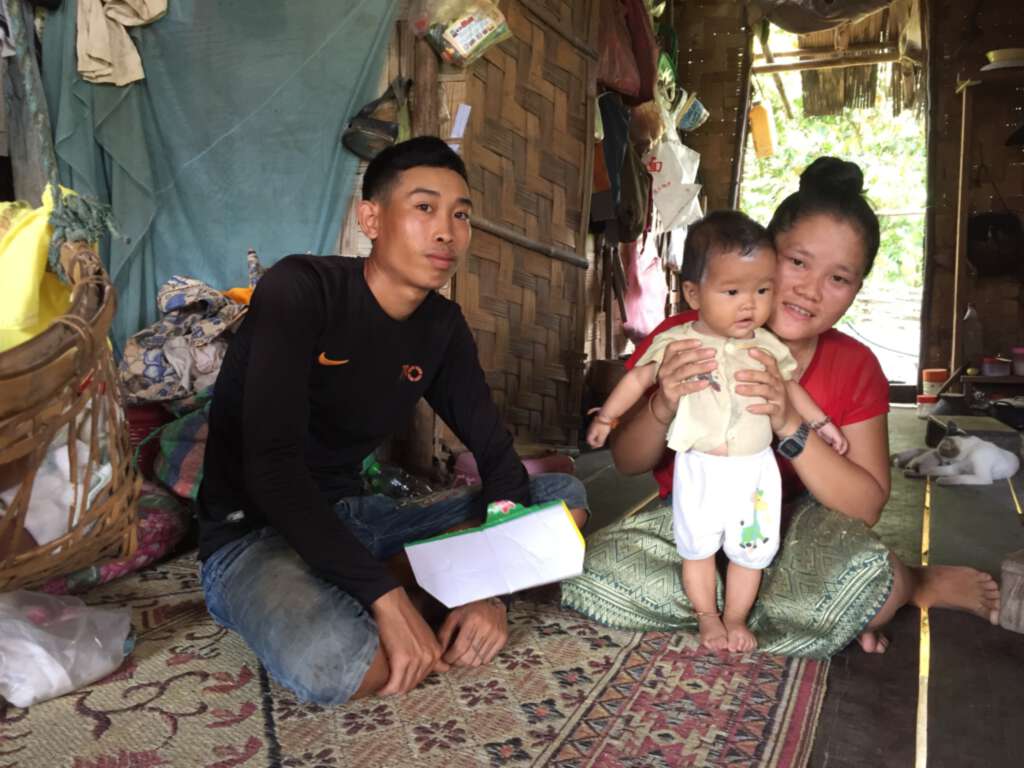
Mr Bounthone (left), Namfuang Village, Met District, Vientiane province. Photo credit: LuxDev
I am Bounthone. I am 22 years old and I am married to Sony Yang. I am 22 and she is 21 and we have a six-month old baby girl. I am Laoluum and Sony is Hmong, from Houaykua. We married last year. The main source of our income is a 0.04 hectare of lowland rice area. When we have a good harvest, we only have one month of rice insufficiency, but when it is a bad harvest, it can be up to 4 or 5 months. We did not have a good harvest in the last cropping season. I received 80 kg of good quality sticky rice from LAO/030, which we are consuming now. We are keeping the little of what is left of the harvest for later. After harvesting rice, I plant vegetables and peanuts. I also provide labour for the villagers to earn money for household necessities. I am hoping to repair my house as soon as the Buddhist lent is over. I received housing materials from the project and the villagers will help me to change the roof.
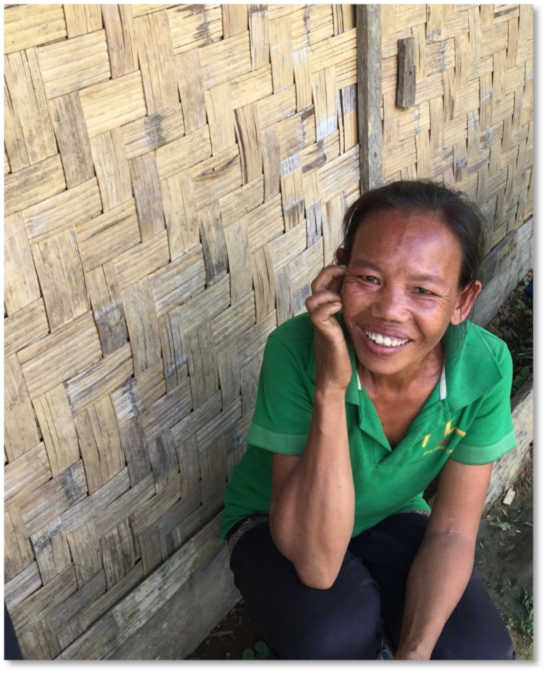
Ms Phong, Phato Village, Kasi District, Vientiane Province. Photo credit: LuxDev
I am Phong, I am 28 years old, married and have two children. My husband is Jek, he is 30 years old and my eldest daughter is a year 3 student at primary school. I am an upland farmer. I have a lowland plot which would be good for rice cultivation, but I don’t have money to clear it. My family is poor. In April my husband and I went to work at the Chinese orange farm for one and a half months and we earnt a little more than two million LAK. We used it to buy rice and we paid back some of our loan. We have suffered from rice insufficiency since June 2020, so the project’s support is very timely. We received 80 kg of sticky rice. The project also supported us with the construction of latrines and the provision of housing materials and now some hygiene items. I would like to thank the project for supporting our village and our family in particular. I hope to be able to borrow some capital from the Village Credit Scheme in the future so that I can develop my small land into a lowland paddy area. This will allow us to support our daughter to continue with her secondary education.
The Local Development Programme for Bokeo, Bolikhamxay, Khammouane and Vientiane Province, LAO/030, is co-funded by the Government of Laos and the Grand Duchy of Luxembourg and is implemented by the Ministry of Planning and Investment and LuxDev, the Luxembourg Development Cooperation Agency.
LAOS - Bolikhamxay Province Declared the first Open Defecation-free province
Poor sanitation and hygiene are pervading problems in rural areas of Laos, particularly in the rural uplands and mountains where poverty is widespread and people continue to live traditional lifestyles. Official statistics indicate that at least 20% of the population practices open defecation, which is a major cause of water-borne diseases and parasite infestation afflicting not least children. This is in turn a major contributor to the high rates of malnutrition and stunting. Putting a halt to open defecation has for long been a government priority, but progress has been relatively slow. It was therefore a major milestone in the national development when Bolikhamxay province on 31 July 2020 was declared the first ‘Open Defecation-Free’ (ODF) province in Laos.
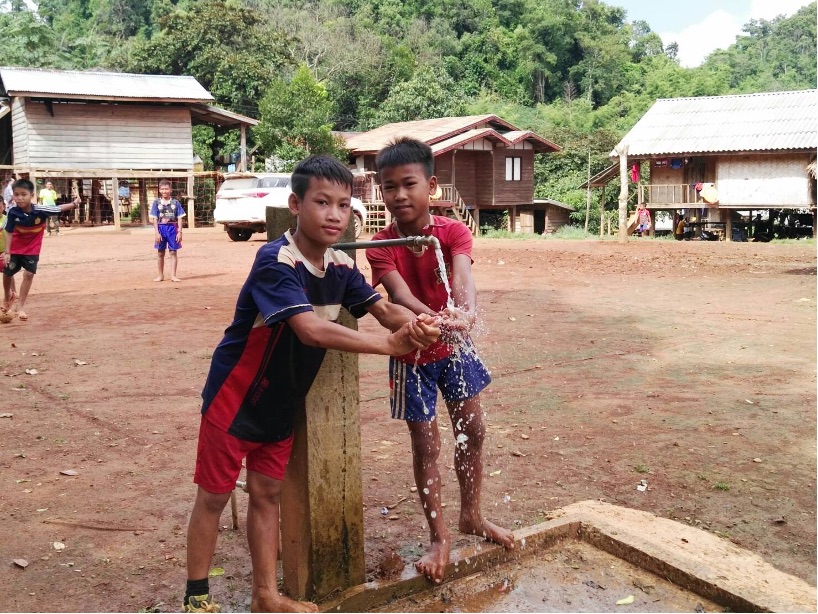 Children enjoy community water stand tap in their village. © LuxDev
Children enjoy community water stand tap in their village. © LuxDevLuxembourg Cooperation project has been a major contributor to achieving this milestone by investing in water, sanitation and hygiene in about 110 of the roughly 300 villages in Bolikhamxay Province, starting already in year 2000. In these target communities, the problem is not so much a lack of understanding of the benefits of toilets, but rather the lack of convenient and sufficient water supplies, the inability of poor families to invest in latrines (amidst many other household priorities), and the lack of community resolve and norms to wipe out open defecation. Therefore, the Bolikhamxay Livelihood Improvement and Governance Project, LAO/021 and later the Local Development Programme for Bokeo, Bolikhamxay, Khammouane and Vientiane Province, LAO/30, both funded by the Luxembourg Cooperation and implemented by LuxDev, have been prioritising support to the local health authorities since 2011 in establishing new improved water supply systems. . Moreover, the communities received village development funds to upgrade existing water supplies, establish water management committees, and subsidize materials for constructing household latrines. By having the villages taking a communal decision on investing their village development funds in water and sanitation, it was possible to achieve ownership and to change the norms towards open defecation and other hygiene practices.
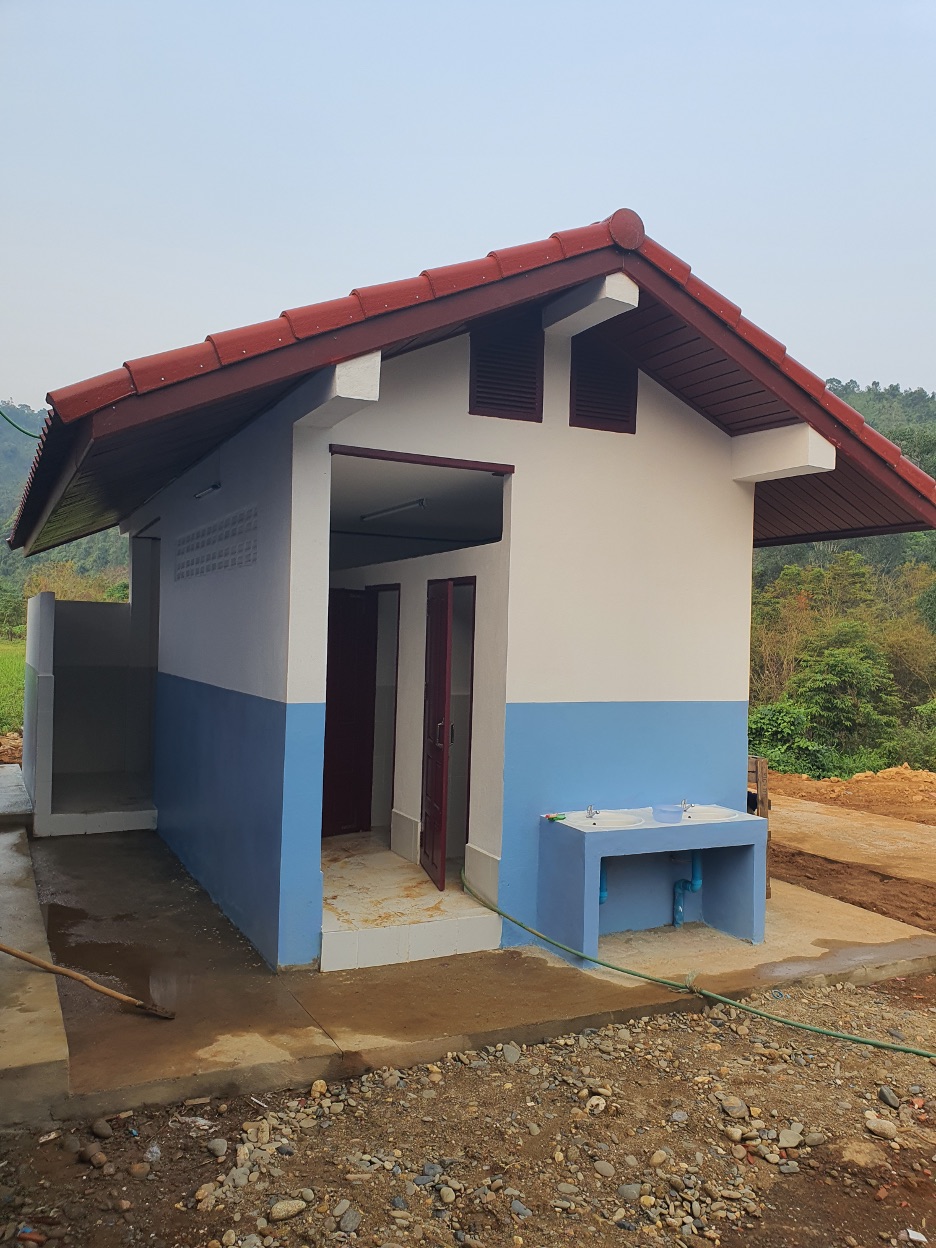 School toilet newly built with community participation. © LuxDev
School toilet newly built with community participation. © LuxDevBy focusing on the more remote villages where improved water supply and latrines were generally absent or lacking, LAO/021 and LAO/030 have had the direct impact and strategic coverage necessary for ensuring that the province could achieve the open defecation-free status. The concrete investment in water and sanitation in 85 villages that practiced almost exclusive open defecation has since 2011 amounted to 1,000,000 EUR, 80% of which was for water supply schemes (as the necessary precursor for the actual use of the latrines, along with other benefits), and 20% for subsidising latrine construction by the individual households. Roughly 50,000 people benefitted directly from these investments, at an average cost or 20 EUR per capita. In addition to this work, 52 community schools, high schools and dormitories have been constructed with access to water and toilets according to national norms for education facilities.
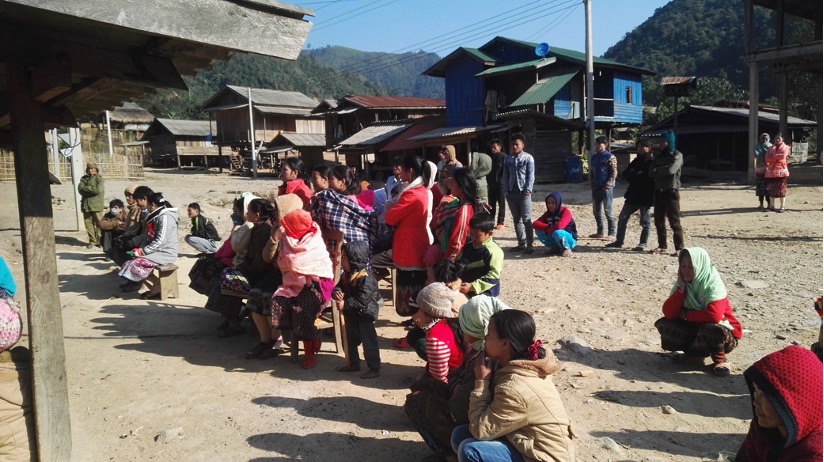 Community Dialouge before providing water supply system and toilet to target village. © LuxDev
Community Dialouge before providing water supply system and toilet to target village. © LuxDevIt should be noted that other development partners have contributed to Bolikhamxay achieving the ODF milestone, particularly UNICEF who focussed on awareness raising and political resolve, e.g. through the support to district-level ODF plans implemented by the Provincial and District Multi-Stakeholders Committee formed with officials from various government agencies. It is quite possible that this helped pave the way for the more practical solutions offered by Luxembourg.
The Lao Government hopes that all seventeen provinces and one capital area in Laos will achieve open defecation-free status by 2025. Luxembourg Cooperation project currently supports this effort in three other target provinces of LAO/030, which can realistically be achieved with the current and planned continuation of Luxembourg support in 2022-26.
LAOS - Providing access to appropriate and affordable financial services in hard-to-reach rural communities
With the emergence of commercially-oriented delivery of financial services to economically active poor, it has been a challenge to penetrate remote rural upland communities considering costs and risks involved. Thus, the majority of micro and rural finance service providers gravitate their operations within urban centers and district capitals. The same phenomenon has been observed in the Lao PDRs micro and rural finance market.
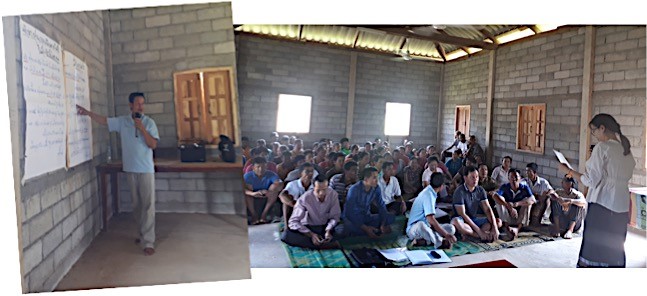
The Lao Microfinance Associasion (LMFA) provincial coordinator for Vientiane province, Ms. Sisavanh Sayodoum, is providing support to the Village Credit Committee (VCC) Manager of Ban NaMai, Muang Fuang District in explaining the VCC regulations, VCC membership criteria on accessing loan including the loan product features with the villagers who have come to the Village Credit Scheme (VSC) opening and loan registration. This activity is a very important part of the VCS opening to ensure that everyone understands the VCS regulation, and loan conditions and requirements. The VCC is responsible for managing and administering the VCS including enforcing its regulations. It is composed of a Manager, an Accountant and a Cashier, © LuxDev.
The Local development programme for Bokeo, Bolikhamxay, Khammouane and Vientiane Province, LAO/030, which supports poverty reduction in target villages in four provinces of Lao PDR, is taking this challenge head-on to develop a village-level rural finance delivery model. One support mechanism is the so-called “Village Development Fund” (VDF), which is allocated to and managed by each village. The VDF process supports participation, local democracy, improved governance and public services. It can be used for two main purposes: Village Grant Scheme (VGS) and Village Credit Scheme (VCS).
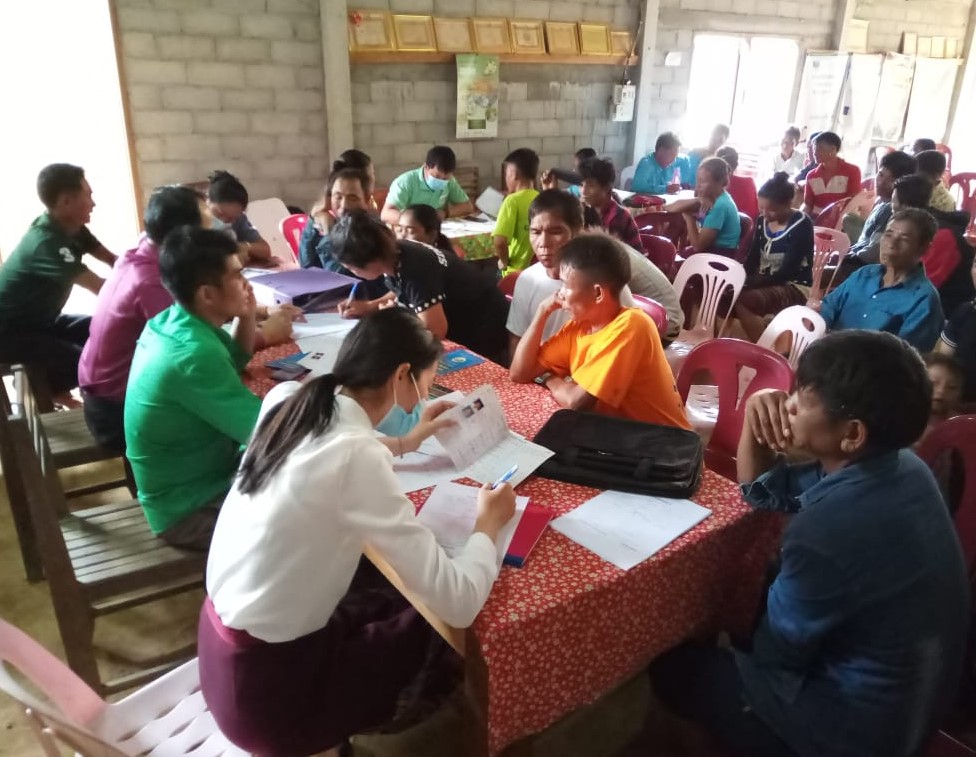
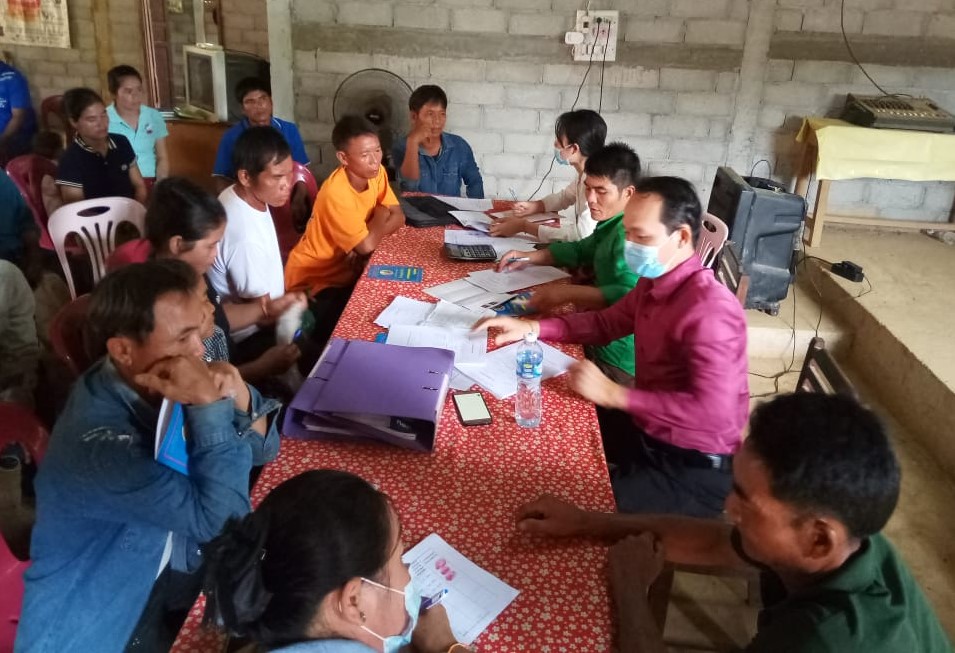
The VCCs with the support of the LMFA implementing team Field Assistant doing the loan registration process at Ban San Sai, Muang Fuang District. Loan registration allows the VCS to determine how many wanted to take loan, how much each need. Each of those that register for a loan are then asked to fill out a loan application,© LuxDev.
The VCS is designed to be a sustainable village-owned micro and rural financial services delivery structure. It provides affordable access to credit for economic activities including, primarily, agricultural production and in some cases, small family-owned business and trade activities. Aside from that, it provides a risk management mechanism for rural households by providing financial support when an emergency occurs. The VCS also give its members the opportunity to earn dividends from its operation through their fixed contributions. According to Mr. Peter Hansen, Chief Technical Advisor of LAO/030, the VDF regulations allows for up to 60% of the VDF to be used for the village credit activities and at least 40% must be available for the grant activities that benefit the poorest households.
Not all target villages will establish VCS, depending on the need and feasibility of setting up a credit scheme in the village. If the village chooses not to establish any VCS, the full amount of the VDF will be used for the grant mechanism.
To bring in international experience and practice while providing local support to capacitate the villages, LuxDev is collaborating with ADA, a Luxembourg Non-Governmental Organization (NGO) supporting financial inclusion worldwide and partnering with local microfinance networks like the Lao Microfinance Association (LMFA). Under the LAO/030 programme, ADA collaborates with LMFA to support the VCS establishment within 3 provinces (Bolikhamxay, Bokeo and Vientiane Province).
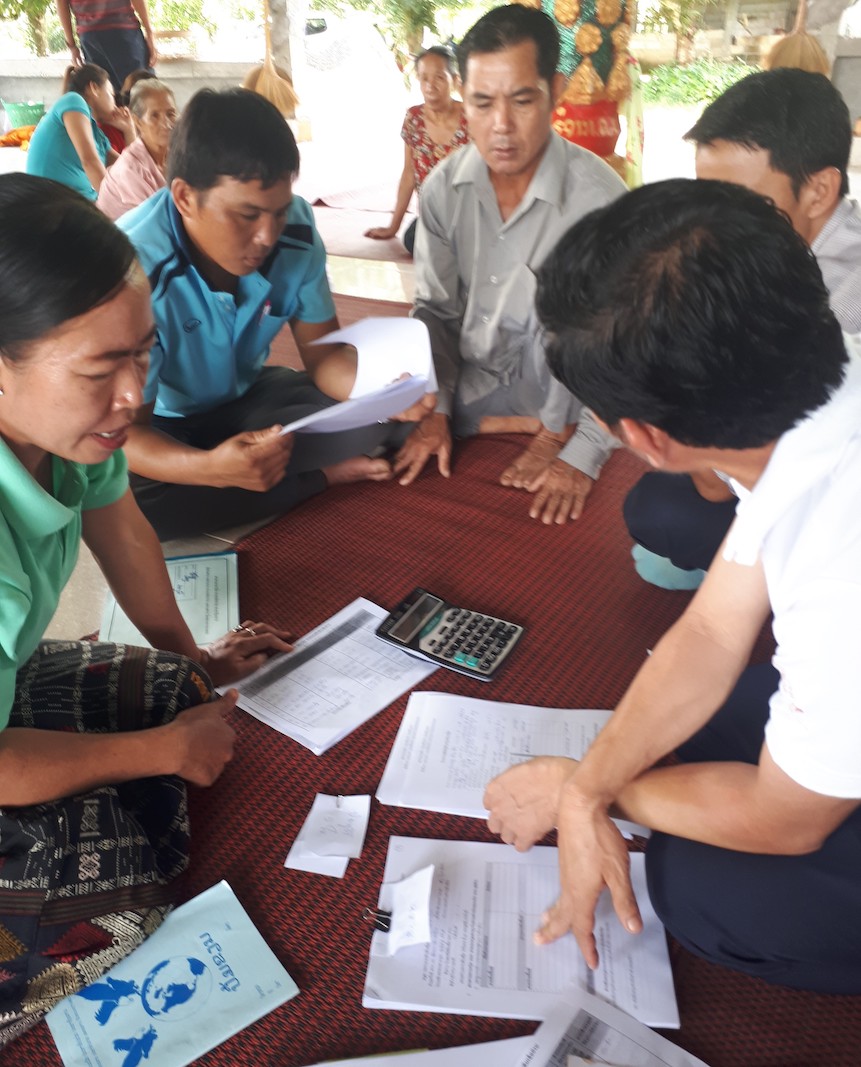
The VCC members at Ban NaMai, Muang Fuang District with the LMFA National Coordinator, Mr. Sangkhy Vongsanith, giving them coaching session on the Loan assessment process. Prior to this, the VCC participated in a 4-day training which covered the loan assessment methodology, but needed a follow up session to endure their capacity to do the loan assessment during the actual VCC opening day,© LuxDev.
In September 2020, the LAO/030 programme, through the efforts of the Project Support Office (PSO) in Vientiane Province, headed by the International Project Adviser, Ms. Emma Aguinot, and the LMFA implementing team with its provincial coordinator, Ms. Sisavanh Sayoudom, has successfully initiated the operation of VCS in 12 villages in Muang Fuang—one of the four target districts within the Vientiane province. “This is the first batch of 12 VCS that LMFA will establish in the province, out of the target of 38 VCS in the province”, as cited by Ms. Pamouane Phetthany, LMFA's Executive Director.
The LMFA, in organizing the VCS, follows a well-standardized process with 15 defined stages developed within LAO/030 under the technical guidance of the programme’s Rural Finance Expert, Mr. Sommay Vilayphan. In addition, to ensure that there is a sustainability mechanism, a Network Support Organization (NSO) will be organized to bring together the VCSs and providing them with a framework in which to operate as well as technical support services.
The Local development programme for Bokeo, Bolikhamxay, Khammouane and Vientiane Province, LAO/030 is funded by the Luxembourg Cooperation and implemented by LuxDev.
LAOS - Luxembourg response to food insecurity during COVID-19 pandemic in rural areas
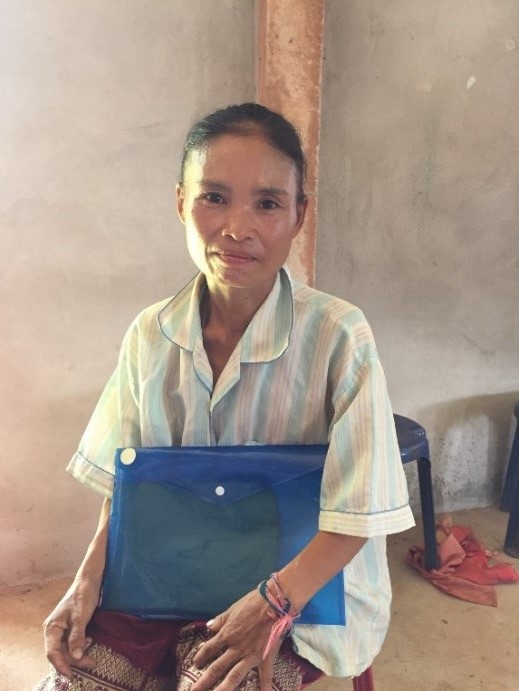
Mrs. Onkeo, 35, married with four children, Namuang village, Fouang District, Vientiane province, © LuxDevMy main source of income is rice farming but what we harvested is not enough. I work as a daily farm labourer to have additional money to buy food. The rice support will help because we will not spend a lot now for rice. I am very happy with the support from the project. The project also supported us to construct our latrines
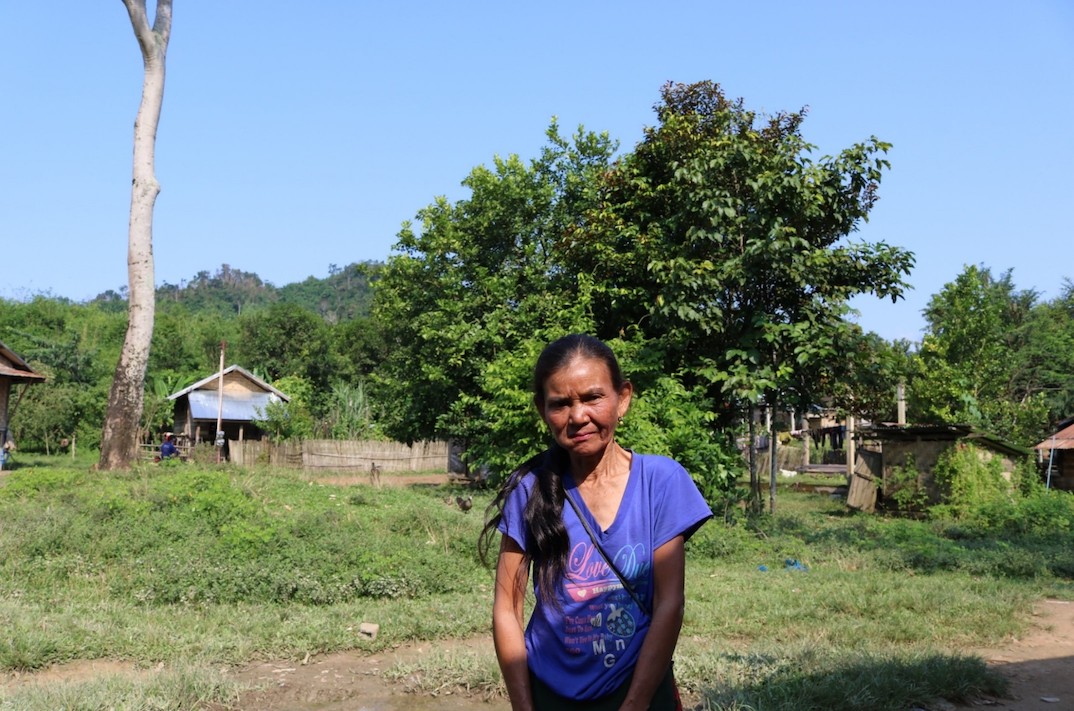
Mrs. Vanh, 50, mother, Houaypamak Village, Met District, Vientiane province, © LuxDevI received 80 kilograms of sticky rice. This will be a big help for us during the lean season. It means that I can save money for buying rice. I will buy salt, other food items and other necessities with the 400,000 LAK that I received. I am very happy and thankful to the project because it also supported me with housing materials and with the construction of my latrine.
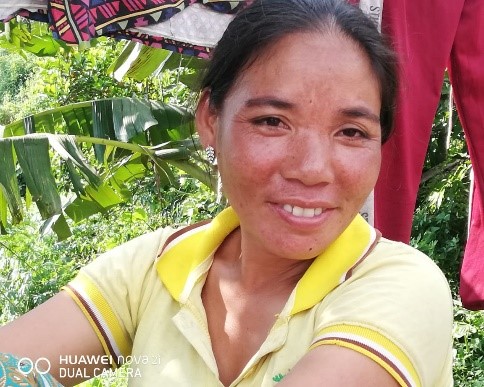
Mrs. Kiao, 39, mother of five children, Daendin village, Kasi District, Vientiane Province, © LuxDevI am very happy with the project. It has supported us in many ways such as with the repair of the water system; we don’t need to walk far to get water these days. It also supported the villagers to construct latrines which made the village cleaner, and now it provided us with rice, which will last up to two months and reduces my burden of working outside to earn money.”I am very happy with the project. It has supported us in many ways such as with the repair of the water system; we don’t need to walk far to get water these days. It also supported the villagers to construct latrines which made the village cleaner, and now it provided us with rice, which will last up to two months and reduces my burden of working outside to earn money.
The coronavirus was declared a pandemic on the second week of March 2020. By March 30, the Lao government announced a strict lockdown for the country and the closure of borders, except for entry of basic food items and medicine. This triggered the massive return of Lao nationals who were working in Thailand and other countries.
In the districts of Vientiane Province where the Local Development Programme - LAO/030 is working, a number of returnees had to be quarantined in schools. Although going to the farms and the gathering of non-timber forest products (NTFPs) were permitted, the villagers were not able to find sufficient food. This is due to the sudden increase of the number of people dependent on the natural resources (forests, rivers and ponds) and the increase in the number of people to be fed. Aggravating the condition is that many households did not have a good harvest in the last cropping season and were declared to be rice insufficient. The LAO/030 team coordinated with the villages and districts to assess the actual and projected needs of the villages with special emphasis on those who are rice insufficient, those who are indigent and those households who are supporting members with disabilities. Based on the identified needs from the four provinces, a discussion was held on how these needs may be responded to – initially it was agreed that the COVID-19 response would come from the existing Village Development Fund (VDF). However, with the high level of needs identified, the Luxembourg government decided to provide an additional 1 million EUR dedicated to this response.
Households with rice insufficiency received 60 kilograms of rice, the destitute households received 80 kg of rice plus an additional 400,000 Lao Kip (about 40 EUR), and households supporting members with disabilities were provided with 80 kg of rice. The support also included hygiene kits for the total village population, and an emergency fund that will be used for isolation and for hospitalization in case COVID cases are identified later.
The total value of support to Vientiane Province is 163,947 EUR, benefitting 30,800 people from 41 villages. The officers and staff of the Department of Planning and Investment, District Planning Offices, the Village Development Committees, with the village authorities managed the distribution with the support of the LAO/030 staff from LuxDev.
After the distribution of rice and hygiene kits to the villages, monitoring of the COVID-19 situation will continue. At the same time, implementation of other planned activities such as provision of infrastructure, strengthening capacity of village authorities and Village Development Committees, and implementation of livelihoods development activities under the Village Credit Scheme and village grant scheme will proceed, trusting that these activities will improve the communities’ readiness and resilience towards other possible emergencies and their ability to adjust to the new normal of living with the coronavirus.
LAOS - Responding to COVID-19 in rural areas
The Government of Luxembourg has granted 1 million EUR to support people in disadvantaged villages in Laos to cope with the economic and health consequences of the COVID-19 pandemic. The support is channelled through the Local Development Programme – LAO/030, which is working with 150 000 people in 229 poor target villages in the four provinces of Bokeo, Bolikhamxay, Khammouane and Vientiane.
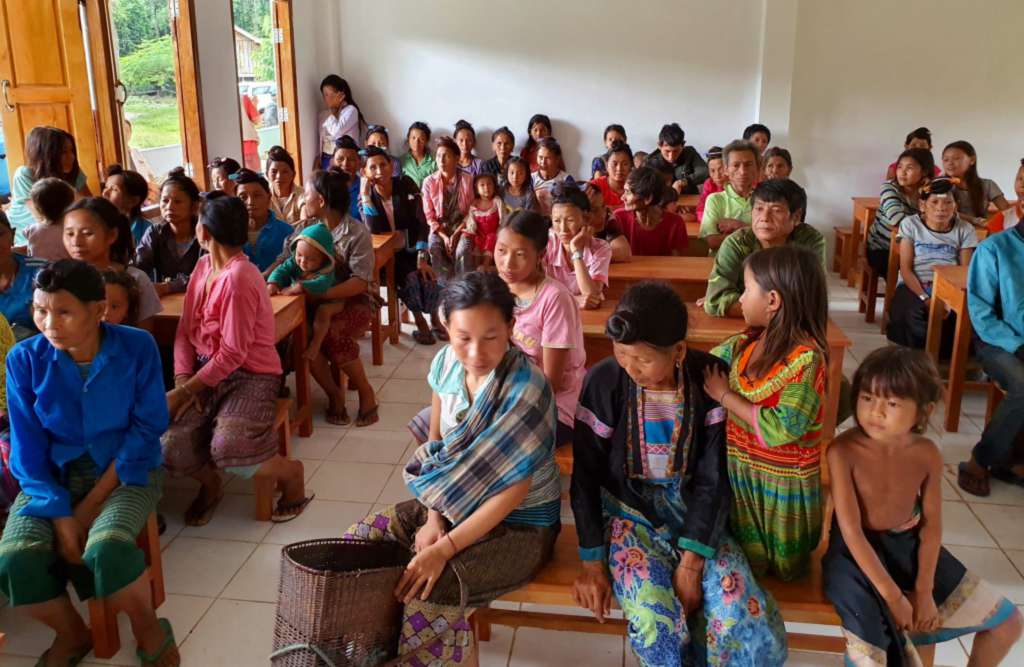 Household representatives awaiting the start of the distribution of rice, and transfer of cash to destitute households, © LuxDev
Household representatives awaiting the start of the distribution of rice, and transfer of cash to destitute households, © LuxDevWhile Laos has so far been spared from serious health impacts of the COVID-19 pandemic, with only 22 known cases and no deaths, the economic impact has been devastating to an already vulnerable economy. The economic fallouts have, as usual, hit the poorest people disproportionally hard. This is the case in the remote upland areas where most of the population lives on less than a US Dollar a day, eked out from marginal farming and supplemented by occasional wage work, remittances from migrant working family members, and small-scale trading. These income sources have diminished and left tens of thousands of people in peril following the lockdowns, the closing of international borders, and the economic slowdown caused by the pandemic.
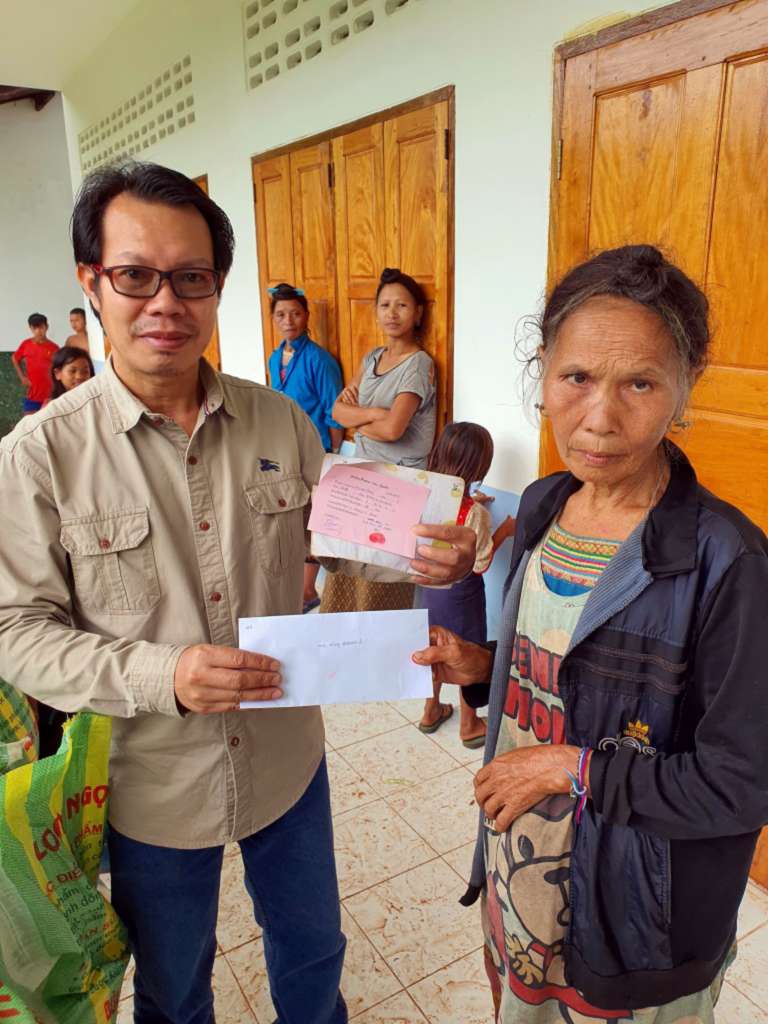
One lady from a destitute household receiving an envelope with 40 EUR in cash. In addition, the family received 60 kg of rice to help bridge the hunger period up to the next harvest 3 month later, © LuxDev
These problems are painfully evident in the LAO/030 target villages, having been selected in the first place for their high poverty rates and vulnerability. Hence, poverty, remoteness, difficult road access, cultural and language barriers, and generally low education levels make the communities ill equipped to cope with the potential spread of the coronavirus and its economic impact. Furthermore, most villages witnessed disastrously low rice yields in 2019 because of adverse weather conditions. In normal years, most people would cope with food insecurity through off-farm work in Laos or even in Thailand. However, the COVID-19 pandemic has undermined such opportunities, while the regular trading in agricultural, handcraft and non-timber forest products have either stopped or seen increased transportation costs that undermines the economic return for farmers. The economic impact of the pandemic means that many people are facing hunger and malnutrition, which will only increase the vulnerability of the population in case of a COVID-19 outbreak.
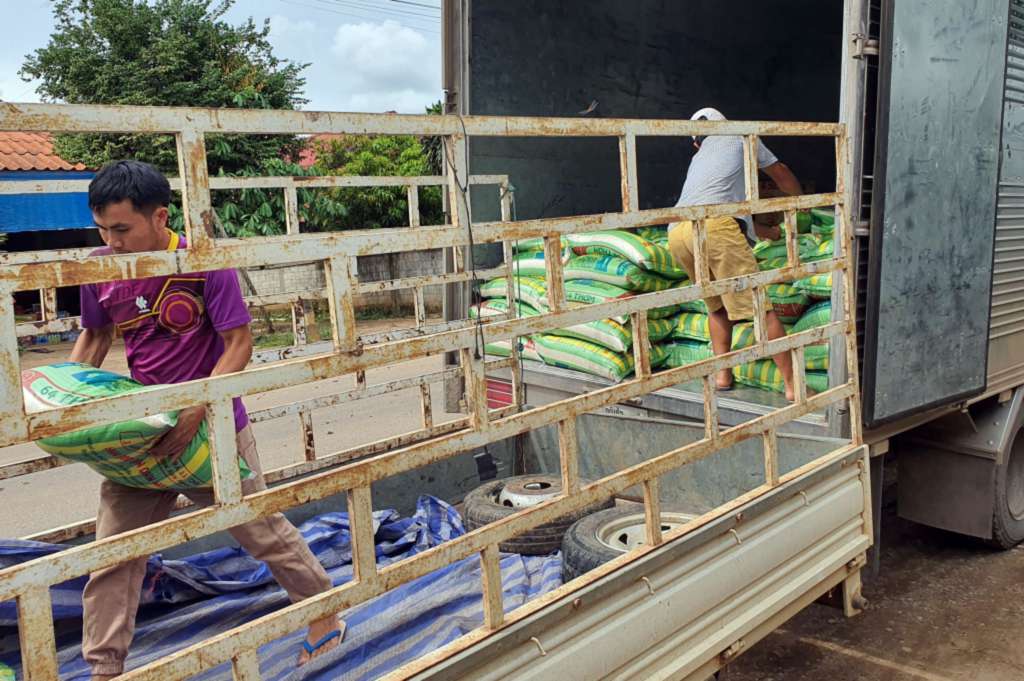 Rice is transferred from import containers to small truck more likely to reach the village on the muddy monsoon roads, © LuxDev
Rice is transferred from import containers to small truck more likely to reach the village on the muddy monsoon roads, © LuxDev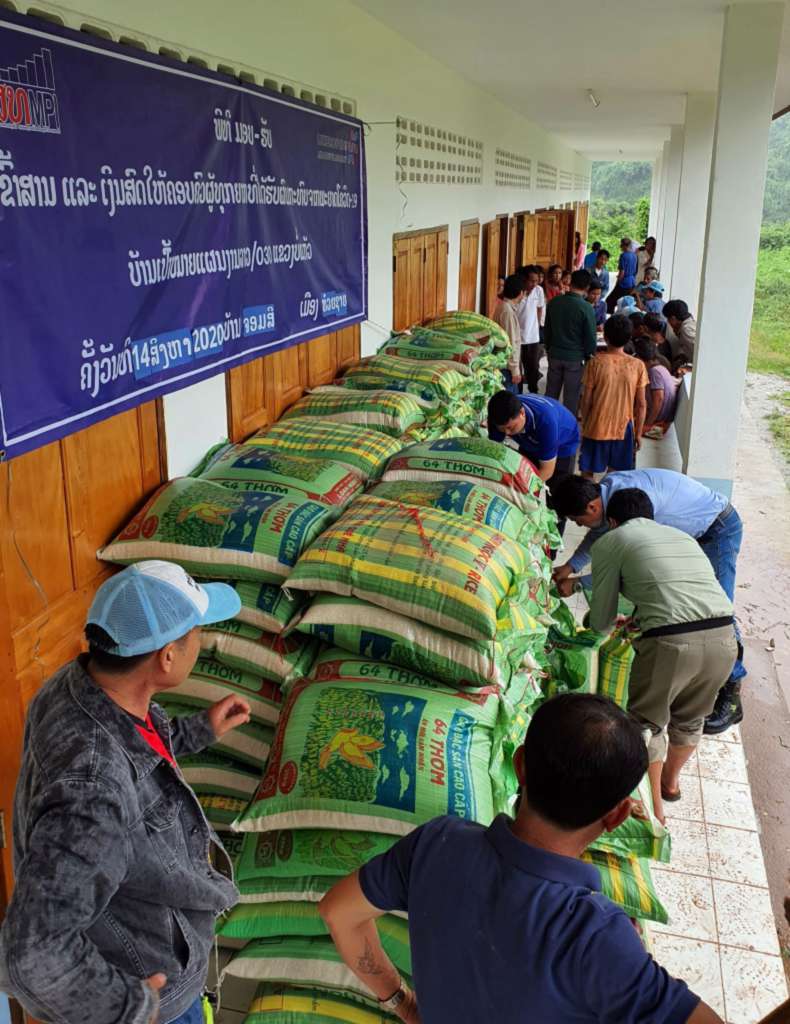
Rice sacks are stacked in the community school ready for distribution to most food insecure families, © LuxDev
To help alleviate these problems in the LAO/030 target villages, in June 2020 the Government of Luxembourg decided to provide a 1 million EUR additional grant. The objective of the response is to mitigate infection rates, mortalities, and food shortages in the 229 target villages. To ensure the transparency and community ownership to the COVID-19 response, the funds are channelled through the Village Development Fund mechanism established by LAO/030 Project since 2017. This means that the village, district and provincial authorities are cooperating on the need identification, procurement, and implementation through already established mechanisms based on participatory principles.
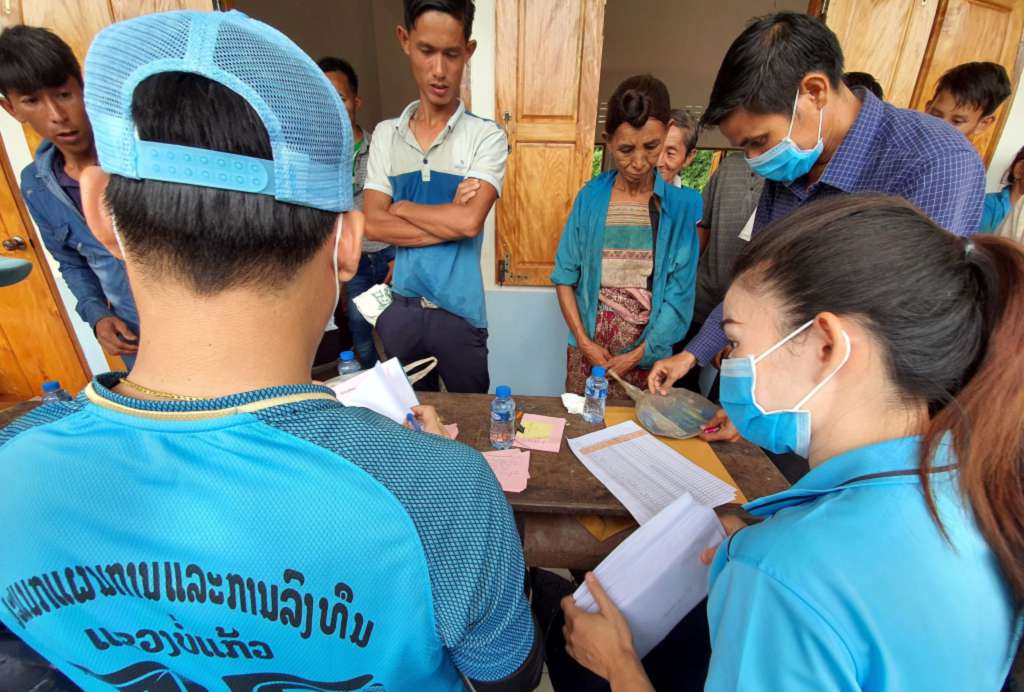 Staff from the provincial Planning and Investment Department confirm villagers’ identity and entitlements, © LuxDev
Staff from the provincial Planning and Investment Department confirm villagers’ identity and entitlements, © LuxDev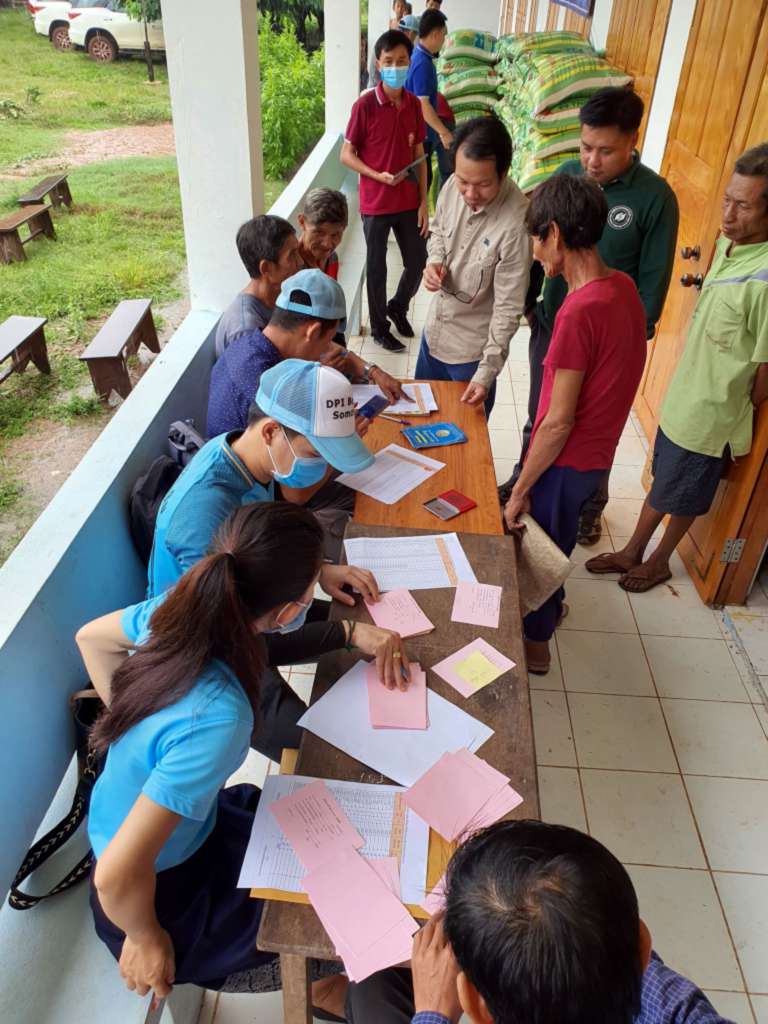
Village, government and project representatives keep track on the distribution to ensure compliance with the community’s need assessment, © LuxDev
Various relevant community-led health and food security interventions were identified, which can potentially be supported depending on the local needs, including:
Cash transfer to destitute households for immediate relief;
- Food distribution to households facing severe food shortage and lacking the means to buy food until the next harvest;
- Distribution of soap, disinfectants and backpack sprayers for disinfection of houses;
- Materials for isolating sick or suspected sick people in schools or community halls, such as bedding, nails, plastic sheeting, individual water containers, mosquito netting;
- Water storage containers and water purification where the regular drinking water supply is running low;
- Facemasks and gloves for people taking care of sick or isolated people;
- Emergency funds for hospitalization, transport, and food during hospitalization in case of referral of sick people to health facilities; and
- Awareness raising and Information material on COVID-19 prevention and control.
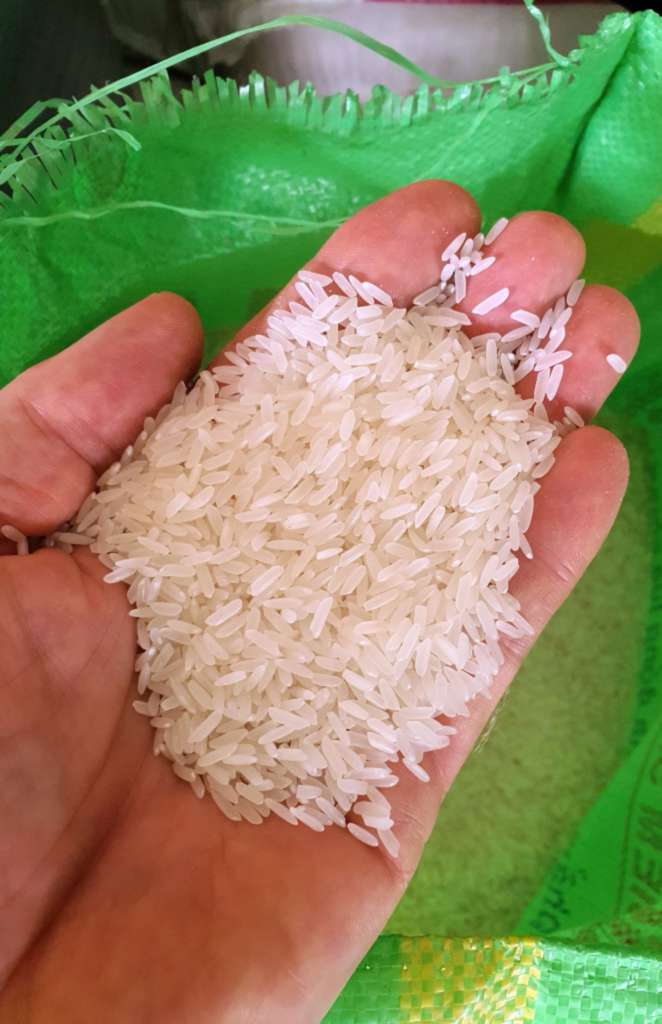
Rice grains
According to the community priorities, most of the funds are used for food supplies to help the most vulnerable families cope with food shortages exacerbated by the economic fallouts of the pandemic. In comparison, about one quarter of the funds are allocated for hygiene purposes and the prevention of other diseases to help the villages prevent and control a potential COVID outbreak.
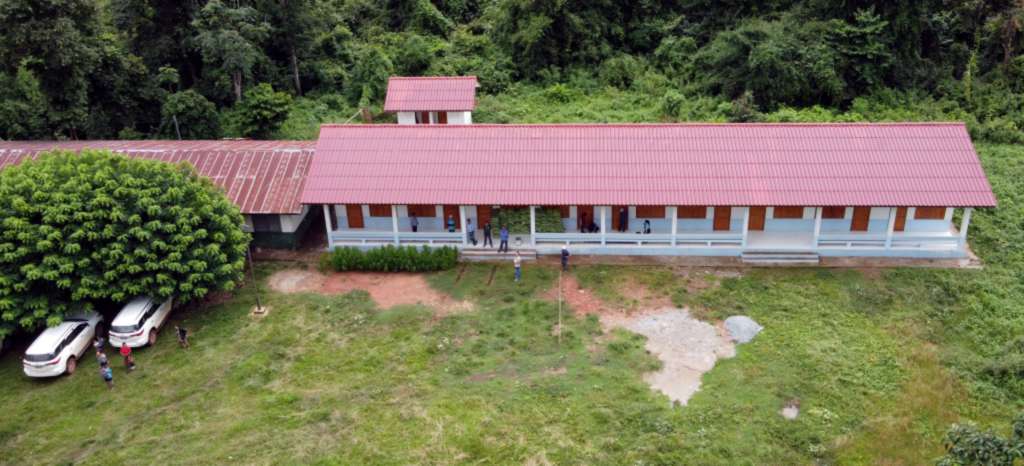 Chomsee Community school, built in 2019 with support of LAO/030 and the site of the food and cash distribution to the most vulnerable families of the village, © LuxDev
Chomsee Community school, built in 2019 with support of LAO/030 and the site of the food and cash distribution to the most vulnerable families of the village, © LuxDevCommunity leaders from each of the villages have identified the families most in need of support. This helps ensure that the support goes to the families most in need. They are grouped into destitute, severely food deficient, and food vulnerable households, and are accordingly supported to different extents. On average across the 229 target villages, an estimated 25 % of the population will receive some level of food support, while the 1-2 % destitute families will in addition receive a cash transfer of about 40 EUR for imminent needs. For the general population, the support focuses on ensuring that the communities have access to hygiene products and knowledge on how prevent the spread of the coronavirus in the families, schools, public offices and health centres.
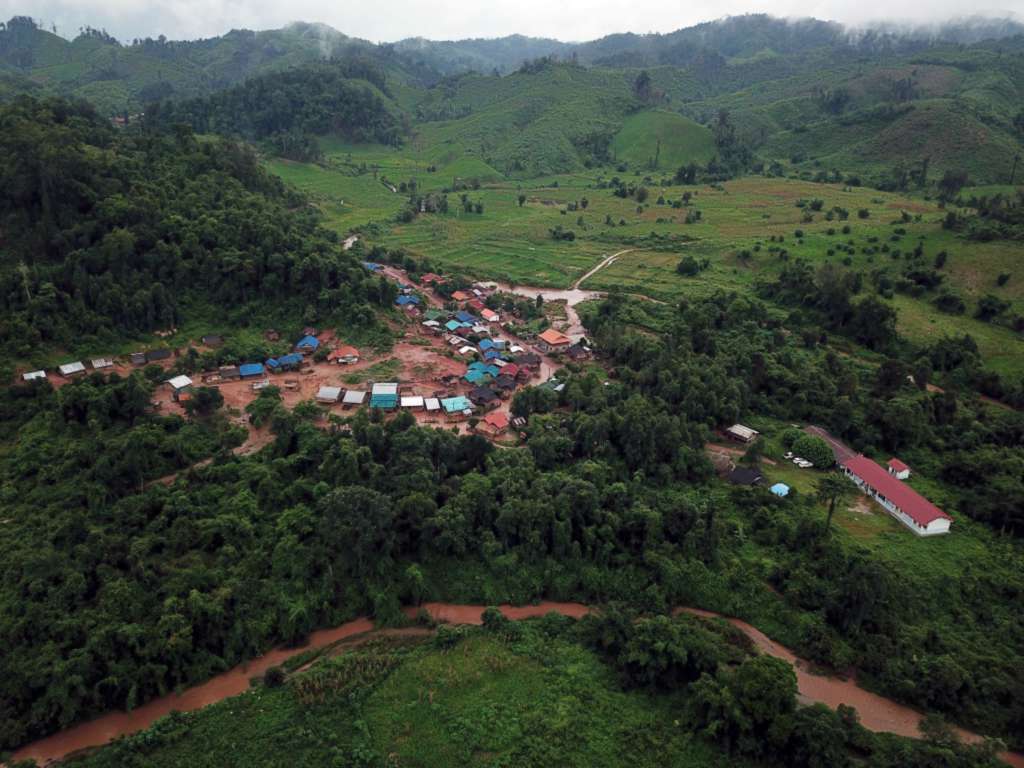 Aerial photo of Chomsee Village in Bokeo Province. To the right, the new Luxembourg funded school where the rice and cash transfer was organised in August 2020, © LuxDev
Aerial photo of Chomsee Village in Bokeo Province. To the right, the new Luxembourg funded school where the rice and cash transfer was organised in August 2020, © LuxDevThe COVID-19 situation and the response by the LAO/030 Project, local authorities, and the communities, have increased the awareness of the need for better disaster preparedness, whether linked to pandemics, natural disasters, or long-term climate impacts. As such, it is likely that disaster preparedness will be an important consideration for future support to local and national development planning.
LAOS - A small loan can lift a poor rice farmer out of povertyA story of Bounthavy Daungphachanh
Being a rice farmer, I used to be very poor and I did not have enough food for myself and my family for the year. With little money, no labour and no knowledge on how to improve the soil and the variety of rice, we had very low harvests. So I decided to apply for a loan from the village credit scheme and my first request for a 3,000,000-kip loan was accepted. I used that money to improve the yields by hiring more workers to plant and look after my rice fields, by getting a tractor and by buying more fertiliser to use in my rice fields. Thanks to the credit scheme, I am now able to grow rice seasonally and have good harvests. Now I have enough to eat and a better livelihood.
To find out more about Bounthavy’s story, watch this video:
The village credit scheme, or village bank, is part of LAO/030 Local Development Programme’s efforts to help lift the poor out of extreme poverty and to bring them over the national poverty line. The Programme works in 14 of some of the poorest districts of Bokeo, Bolikhamxay, Khammouane and Vientiane provinces, encompassing 229 villages and counting together 150 000 people, 70% of whom come from various ethnic groups.
LAOS - Village Credit Scheme helps improve lives of the poorest of the poor. A story of Naed Vongprya
Life has been tough since my husband become a disabled person. A few years ago, I wanted to start a household business but no one would give me money beause I had no guaranty for the loan. Then, fortunately I received a first loan of 500,000 kip from the village credit scheme which enabled me to raised some pigs and sell them out for a good price. I have now borrowed 3,000,000 kip from the village credit scheme to grow my pig raising business. So, thanks to the credit scheme, if things go according to plan, I hope I could earn more income to support my whole family through the next batch of pig selling.
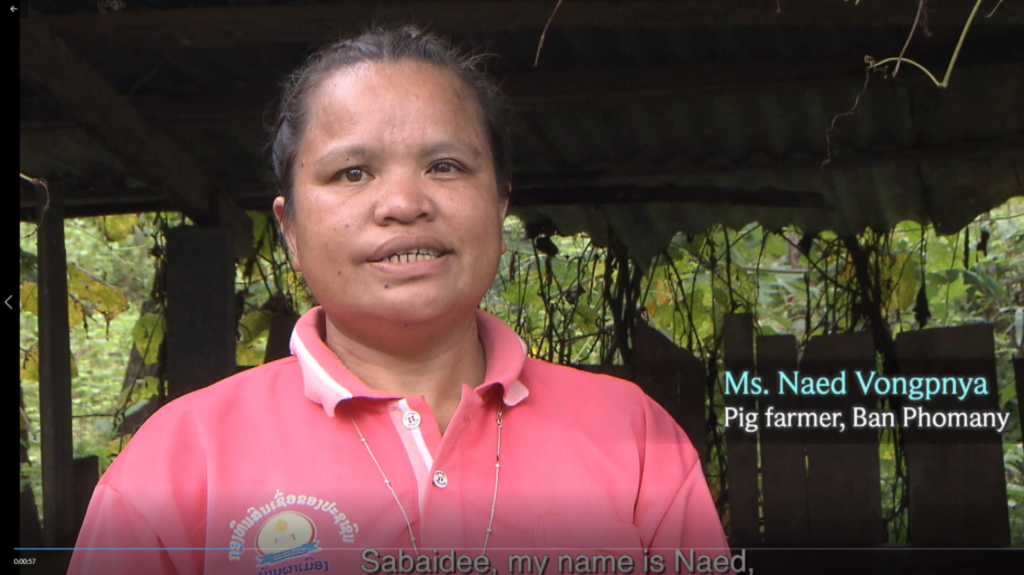 Nad Vongprya, a member group of village credit scheme, Bolikhan district, Bolikhamxay province. © LuxDev 2019
Nad Vongprya, a member group of village credit scheme, Bolikhan district, Bolikhamxay province. © LuxDev 2019To find out more about Naed’s story, watch this video:
The Village credit scheme is part of LAO/030 Programme’s effort seeking to help the poor getting out of extreme poverty and bring them over the national poverty line. The Programme works in 14 of the poorest districts of the Bokeo, Bolikhamxay, Khammouane and Vientiane provinces and particularly in 229 villages counting together 150 000 inhabitants, 70% of whom are ethnic groups.
LAOS - Luxembourg continues to support poverty reduction in Laos
The LAO/030 programme supports poverty reduction in disadvantaged upland areas through practical development combined with governance strengthening. The primary beneficiaries are 150,000 people, mostly ethnic minority groups, in 229 villages with high poverty rates. The programme also works with Caritas Luxembourg, who is supporting Provincial Nutrition Committees in Bolikhamxay and Vientiane province to alleviate the high rural malnutrition rates. Collaboration with another Luxembourg NGO, ADA, focuses on improving poor people’s access to financial services.
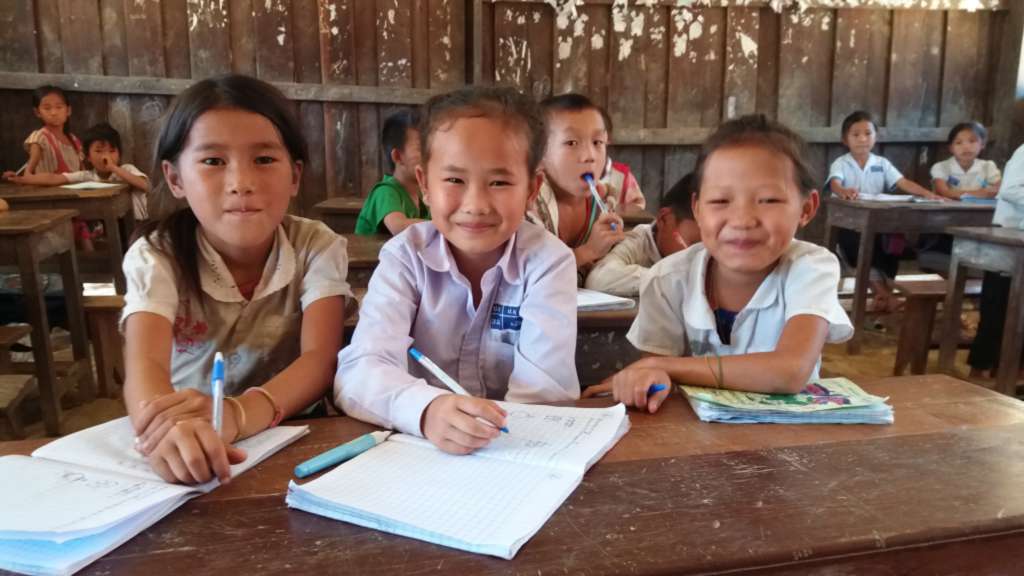
The programme focuses on four approaches:
- community-led development for practical and strategic priorities;
- governance strengthening in local development and poverty reduction;
- delegation to all administrative levels and sectors according to their mandates;
- policy dialogue, knowledge management and networking informed by practical development work.
Watch more detail of the programme here: https://youtu.be/elvCpVbq4bA
LAOS - Luxembourg provides support on nutrition in Bolikhamxay and Vientiane Province
The Local Development Programme LAO/030 and Caritas Luxembourg join hands in supporting the nutrition sector in the Lao PDR.
An Executing Agreement (EA) on Nutrition convergence support in LAO/030 target provinces between LuxDev, Luxembourg Development Cooperation Agency and Caritas was signed on 8th February 2019 at the Embassy of Luxembourg in Vientiane Lao PDR.
The EA was jointly signed by the Managing Director of LuxDev, Mr Gaston Schwartz and the President of Caritas Luxembourg, Mrs Marie-Joseé Jacobs. The signing ceremony was attended by Mr Sam Schreiner, Chargé d’Affaires of the Luxembourg Embassy in Vientiane, and by senior Lao officials from the Ministry of Planning and Investment and the Ministry of Health.
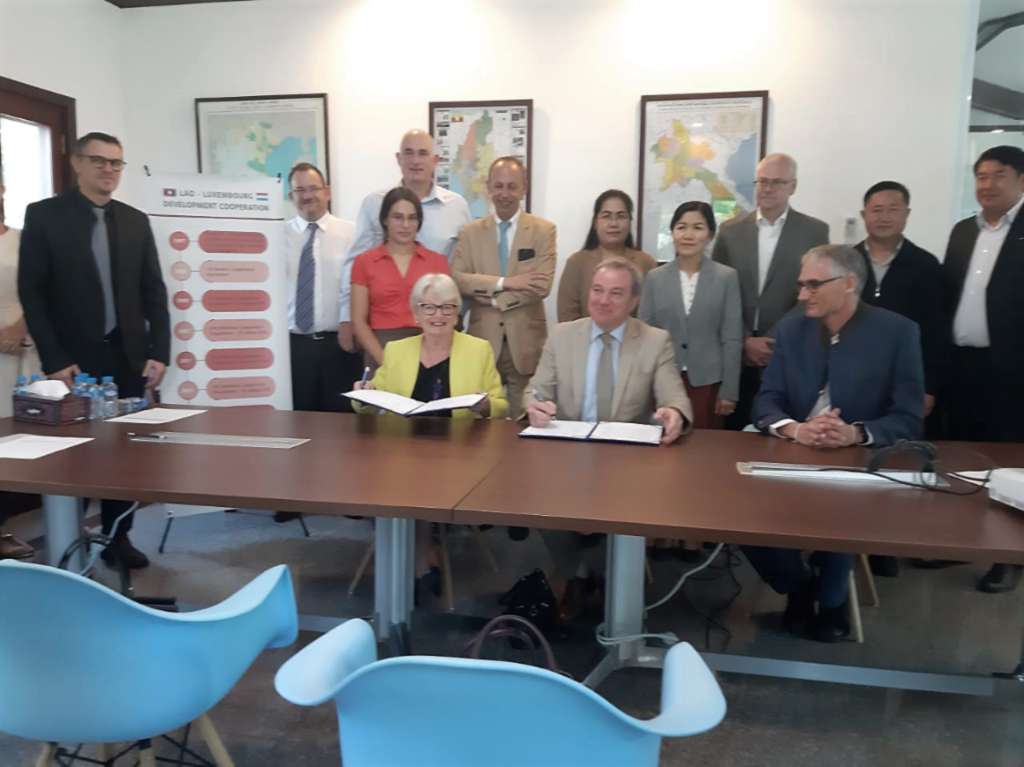
This joint support is part of an ongoing development effort of the Luxembourg Aid and Development’s contribution to poverty reduction in Laos, including malnutrition and hunger.
The overall objectives of the Nutrition convergence are to:
- strengthen the coordination among government agencies and civil society in nutrition;
- build capacity of local authorities and Lao civil society; and
- assist in awareness raising of nutrition at community level in the programme target areas in the two provinces.
The total budget for this project is 312,740 EUR. It will run from February 2019 to December 2020.
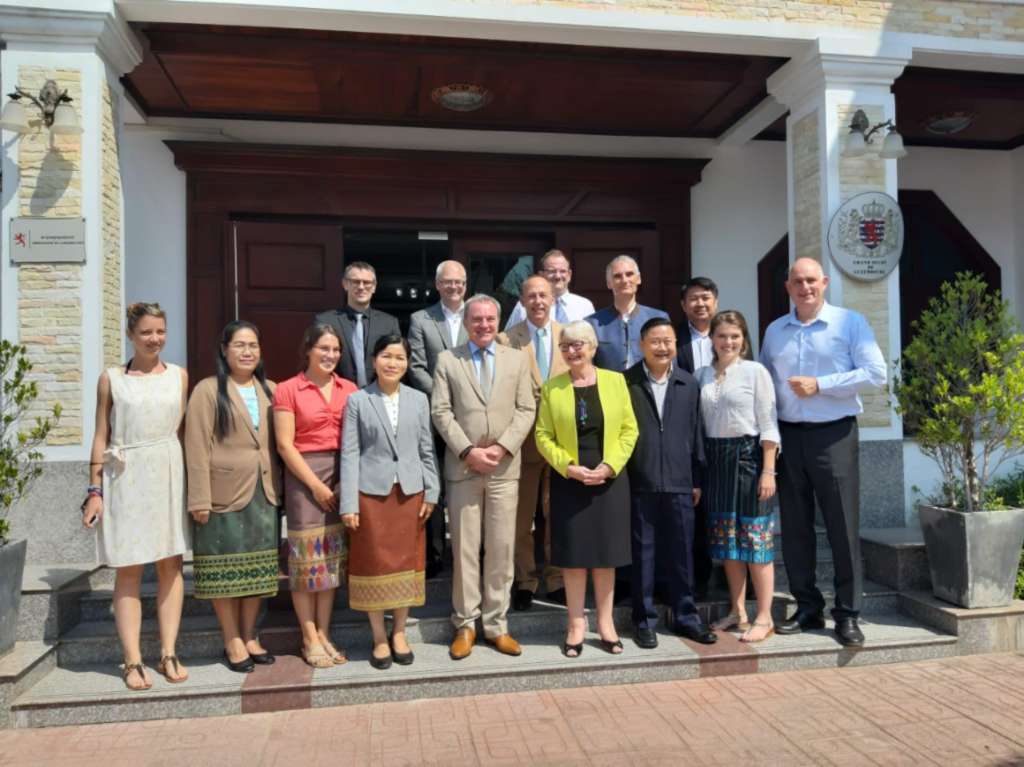
This collaboration focusses on improving nutrition through better coordination of the Lao Government’s multisectoral nutrition convergence approach. Caritas will support the provincial nutrition committees in two of the Lao-Luxembourg target provinces, Bolikhamxay and Vientiane.
Caritas already has experience with similar work in Xiengkhuang Province, and thereby brings both expertise and credibility to the table. Caritas will also be able to facilitate the inclusion of other NGOs and non-profit associations in the network coordinated by the provincial health departments.
At the same time, the Local Development and the Health Programmes are funding numerous nutrition-related activities in the two provinces, which will benefit from the enhanced coordination by the provincial authorities. These investments will also give leverage to the joint work towards real impact on nutrition in poor communities supported by Luxembourg Aid and Development.
LAOS - 7 reasons why the Local Development Programme LAO/030 uses village development funds to overcome poverty
In late November 2018, Regional Office in Vientiane Laos, as part of the mid-term evaluation team, visited several villages in Bokeo province (north of Laos) where the programme LAO/030 is working with 52 poor and multi-ethnic villages to improve better livelihood through Village Development Fund approach.
On the way to the target villages, we spoke to Mr Sisouk Khounvithong who is the Provincial Programme Coordinator about the village development funds and its planning in general.
Question: Why are village development funds supported by LAO/030 programme important in improving people’s live in the target villages?
Answer: In my view, they are, in many ways because:
1. Each community decides to use the fund based on their real need in a transparent and democratic way; 2. Each community decides, in consensus, to use the fund to help the poorest of the poor in their villages; 3. Each community selects representatives themselves who they can trust and handle the funds; 4. The fund directly meets community needs based on village development potential (geographically and local knowledge); 5. Village planning and its identified activities come from voices of all group (adult men, women and the poor) of people in each community; 6. The village development fund benefits both poorest of the poor households and community as a whole. So, no one is left behind;
7. Each village manages the funds with direct technical support from district authorities.
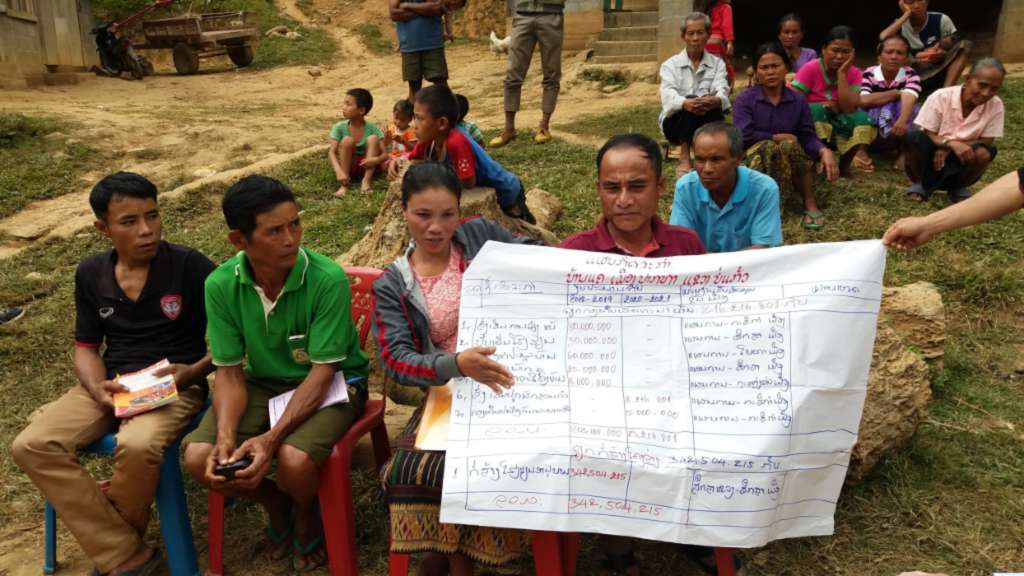 Village Development Fund Committee member explains the village activities implementation plan to the Mid Term Evaluation Team at Khae village, Parktha District, Bokeo province
Village Development Fund Committee member explains the village activities implementation plan to the Mid Term Evaluation Team at Khae village, Parktha District, Bokeo province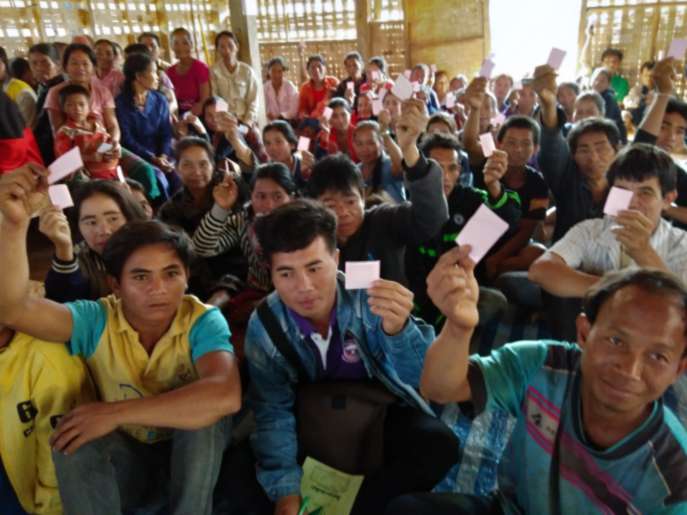
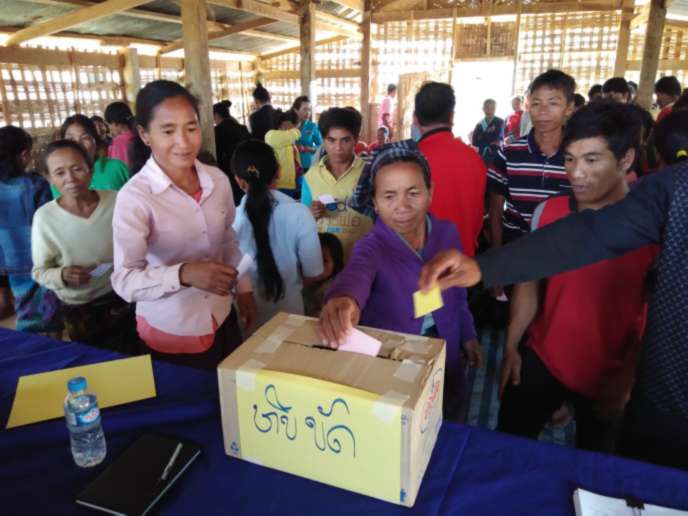
Villagers vote for their Village Development Fund Committee and its activities, Piengthueng village, Pha Oudom District
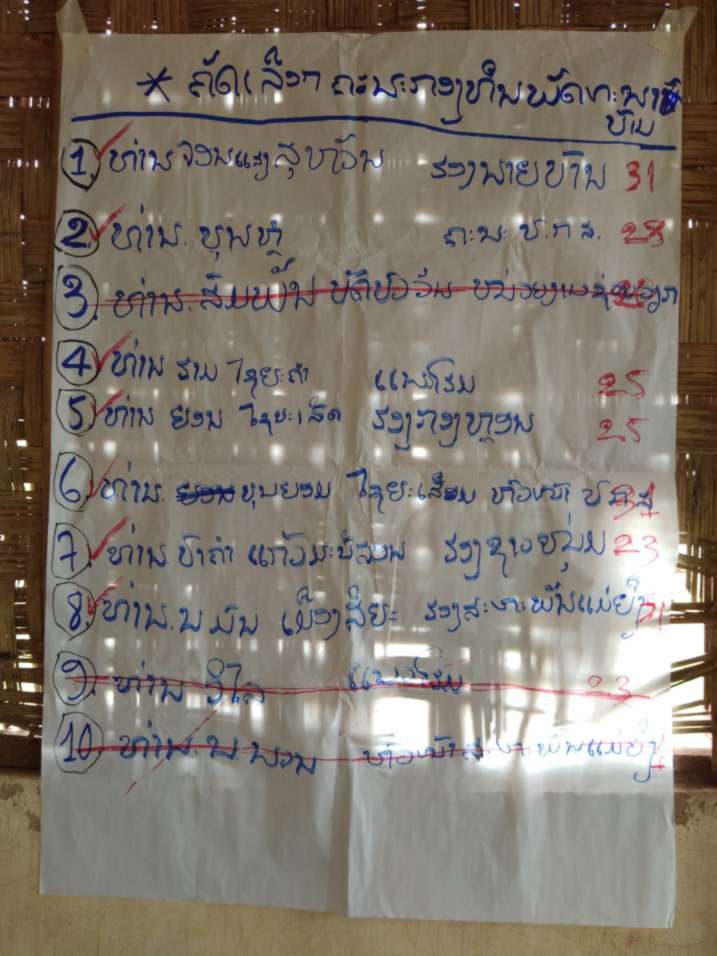
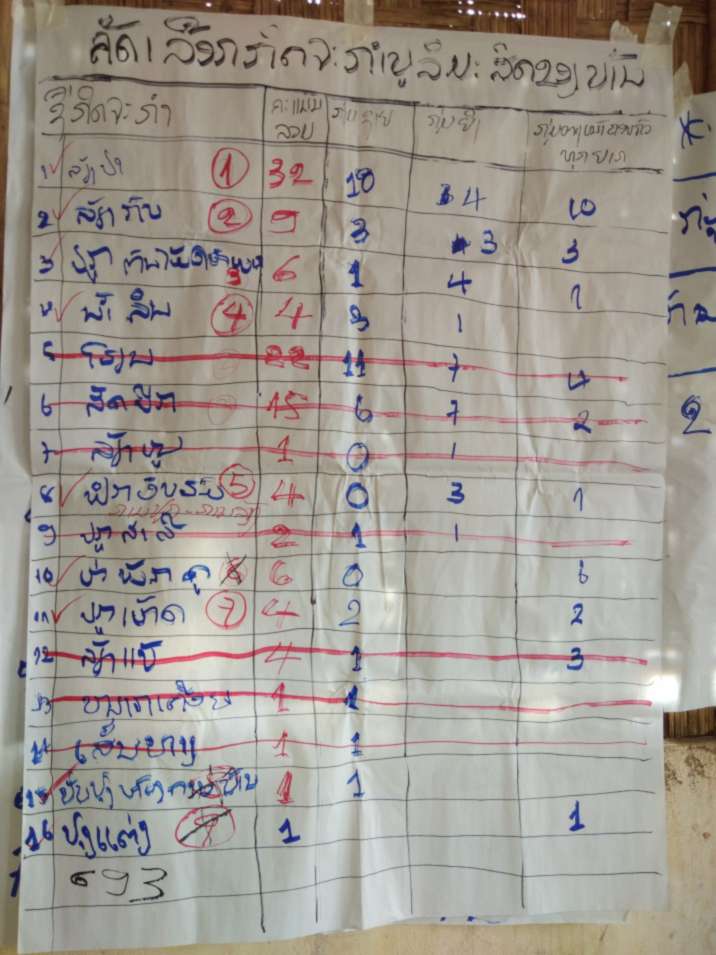
Village Development Fund Committee selection result and village activities priorities and ranking, Piengthueng village, Pha Oudom District, Bokeo
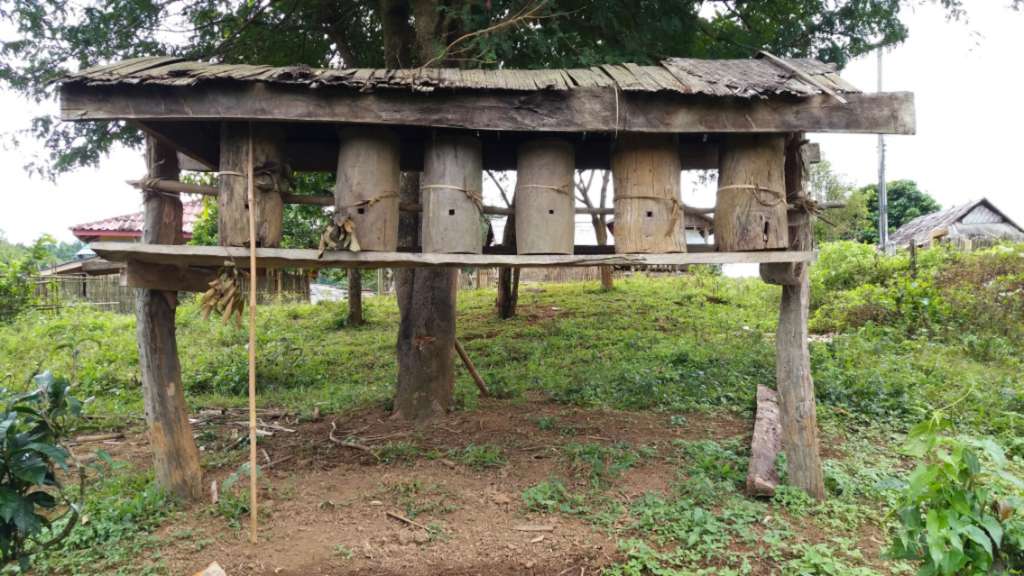 Most of the villagers in Tor Lae, Bokeo province are raising local bees as part of their income generating activity from generation to generation.
Most of the villagers in Tor Lae, Bokeo province are raising local bees as part of their income generating activity from generation to generation.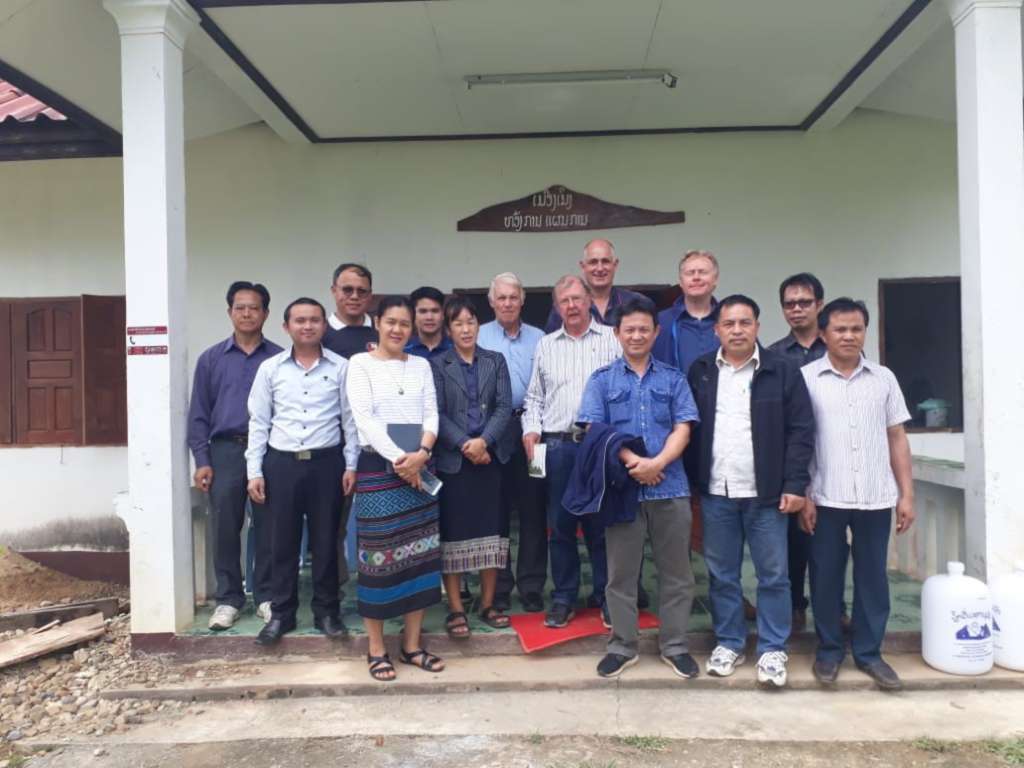 Mr Sisouk Khounvithong, on the front row second right, is the Provincial Programme Coordinator and the Deputy Director General of Provincial Planning and Investment Department of Bokeo.
Mr Sisouk Khounvithong, on the front row second right, is the Provincial Programme Coordinator and the Deputy Director General of Provincial Planning and Investment Department of Bokeo.Laos – “Nothing ever becomes real until it is experienced”High-level field visit within the scope of LAO/030 Local Development Programme in Laos
The Lao Luxembourg Cooperation Programme will launch the “Local Development Programme for Bokeo, Bolikhamxay, Khammouane and Vientiane Provinces – LAO/030” in May 2017. This 23 million EUR programme will support poverty reduction in more than 200 villages in the poorest districts of the four target provinces. The project is based on the highly successful Bolikhamxay Livelihood Improvement and Governance Project - LAO/021 Project carried out in 2010-16, which contributed substantially to improving living standards in 60 target villages through innovative poverty reduction strategies.
To help the new programme get off to a good start and to create a common understanding of the planned principles and modalities, the Bolikhamxay provincial authorities arranged a four-day field visit to the LAO/021 project area, including discussions with people in eight of the former target villages.
The participants included representatives from the Ministry of Planning and Investment (MPI), the four provincial planning departments of LAO/030, staff from three districts visited, and project staff. Notably, the Director General of MPI’s Planning Department, Madame Phonevanh Outhavong, and the Director-General of LuxDev, Mr Gaston Schwartz, participated in the visit, along with the LuxDev Regional Representative, Mr Olivier Hecquet.
At a practical level, the study tour gave an opportunity to observe some of the tangible results of the LAO/021 project, including village development funds, credit schemes, district micro-finance institutions, and rural infrastructure such as schools, water supply schemes, and bridges. This established a framework for discussions on the innovative principles for decentralisation, participation and empowerment at province, district, and village levels. Through these mechanisms, the LAO/021 project delegated 56% of its budget to Lao implementing partners, used Lao government structures throughout the project and spent 72% of the funds on village-level interventions with a direct poverty focus. Moreover, the project promoted capacity development through learning-by-doing, supported by targeted training, coaching and technical assistance. These modalities will be adopted and further developed in the new LAO/030 programme.
While decentralisation, participation and local democracy are firmly embedded in the Lao government’s policies, their actual application requires further advocacy and practical examples to ensure that the implementing government agencies have full confidence and understanding of their use. In this regard, the field visit offered an excellent opportunity for discussion among the group of composed of both strategic decision makers and practical implementers. The presence of the two Director-Generals gave further weight to the importance of building LAO/030 on shared values and principles, which is essential for executing a highly decentralised and multi-sectorial programme.
The LAO/030 programme will, over the coming 5-6 months, develop action plans to align the support with the local development plans of the four target provinces. Guidelines and initial capacity development will also be carried out in order for practical activities to commence in earnest at the start of the dry season in September, when the remote target villages are accessible and farmers have completed their busy cropping season.
